DOWNLOAD
ROUNDUP: DECEMBER 2011/1
Brian Wilson
The November 2011/2 Roundup is here,
November 2011/1 is here
and earlier editions are indexed here.
You won’t be surprised that a good deal of this month’s Roundup
is dedicated to recordings of Christmas music. I’ve tried to
include a sprinkling of well-known favourites among mainly less
well-known items. I have to admit that the latter make more
comfortable listening in the middle of November – I hope to
include more well-known material next time.
When I recommended the download of Howard Skempton’s Lento
in my previous Roundup, I didn’t realise that it’s also available
as part of a NMC album with music by Dominic Muldowney and Barry
Guy on NMCD032, available from classicsonline.com
or available for streaming from the Naxos Music Library.
In terms of pence per minute, that’s better value than the single,
especially when classicsonline.com charge £7.99 for both.
Pick of
the Year
The Download Roundups have escalated so much this year – now
twice a month – that all my choices are taken from them. One
advantage of the Roundups is that I can trawl the back catalogue
but I’ve limited my six choices to recent releases and reissues.
The selection has been very difficult, necessitating the omission
of such fine recordings as John Wilson’s resurrection of the
MGM Musicals at the Proms and for EMI and the BIS survey of
Schumann’s Complete Music for Violin and Orchestra, both in
the September 2011/1 Roundup.
John Neschling’s recording of Respighi’s Roman Trilogy (BIS – February 2011 Roundup)
is another notable casualty.
There have been so many releases of medieval and renaissance
music that I reluctantly put aside Alexander Agricola’s Missa
in myne Zyn (Ricercar – January 2011 Roundup),
Alamire’s Tallis and Byrd’s Cantiones sacræ (2
Obsidian CDs – March 2011/1 Roundup)
and their Taverner (Obsidian – November 2011/1 Roundup)
or I Fagiolini in 40-part music by Striggio and Tallis (Decca – April 2011/2 Roundup).
The winner has to be The Tallis Scholars’ new recording of Josquin,
Missa de beata virgine and Missa ave maris stella,
the latest in a superb series (Gimell – November 2011/1 Roundup).
In the quatercentenary of Victoria’s death, The
Sixteen released an anthology of Marian music (Coro – May
2011/2 Roundup).
Reluctantly I set this aside, along with various Hyperion Helios
reissues at budget price in favour of the new Westminster
Cathedral recording on Hyperion which also stands as proxy
for all their recordings of this composer which I listed in
the November 2011/1 Roundup).
The whole of Masaaki Suzuki’s traversal of the works
of J.S. Bach is well worth having. Volume 48 of
the complete cantatas is no exception (BIS – July 2011/1 Roundup).
This and other BIS recordings are best purchased as downloads
via the eclassical.com website – more from this source will
be found in the September 2011/2 Roundup.
A set of late Mozart Symphonies conducted by Jukka Pekka Saraste
on a budget-price 2-CD set from Virgin Classics which I reviewed
on CD would have been a strong favourite had there not been
some excellent Beethoven recordings this year. I set
aside Emmanuel Krivine’s revelatory survey of the symphonies
on period instruments (Naïve – July 2011/1 Roundup)
and Riccardo Chailly’s equally fine set (Decca – November 2011/2
Roundup)
in favour of his Complete Works for Piano and Orchestra from
Howard Shelley and Opera North (Chandos – November 2011/2
Roundup).
In any case, the classicsonline.com download of the Mozart is
currently uncompetitive at £14.99 when the CDs can be
had for half that price.
My bargain of bargains has to be the complete Sibelius Symphonies,
Lemminkaïnen and Violin Concerto (Amazon, from
BIS originals – June 2011/2 Roundup).
These are all first-class performances with Osmo Vänskä
at the helm and the downloads come at decent bit-rates. You’ll
find some other bargains in that Roundup, too, as identified
by Nick Barnard.
English Music has done well this year but nothing overshadows
the 6-CD reissue of Beecham’s recordings of (mainly)
Delius with German, Bantock, Bax and Berners (EMI – July 2011/1
Roundup).
Even fine new performances of Delius – Appalachia and the Violin
and Double Concertos, both from Chandos must take back seat.
My friend Geoffrey Molyneux has sent me his thoughts
on the VICTORIA – I’m including them because he’s a little
less enamoured than I was:
In the first piece, Salve regina we are made aware of
the style of this performance, large in scale and making full
use of the cavernous spaces of Westminster Cathedral. In fact
the acoustic of the venue largely determines the sound quality
of these performances. Then follows the first of two masses
by Victoria, Missa De Beata Maria Virgine (1576). This
and the second Mass on this disc, Missa Surge propera
is truly wonderful music and it is great to relish these Victoria
masses performed here by such a superb choir.
However I do find the performances difficult in that the men’s
voices do not always seem to blend well within themselves and
with the boys’ voices, especially in the louder, more jubilant
sections in the first mass. I much prefer the quieter music
where you can really hear what is going on in Victoria’s polyphony.
I like the performance of the second mass better and I very
much like the choir’s rendition of Palestrina’s Surge, propera
amica mea, et veni, though again I can sometimes hear a
few individual men’s voices with a distinct vibrato.
The Westminster Choir gives a full-bodied performance of Victoria’s
Missa Surge propera with very smoothly contoured lines
and evenly flowing crescendos. The trebles soar above in appropriate
fashion, and we can enjoy the acoustics of this magnificent
cathedral. I have been comparing this with a performance by
Mixolydian under Piers Schmidt recorded in Merton College Chapel,
Oxford in April 1989. (Allegro PCD970 [no longer available:
BW]) This performance is given with much smaller
forces and at a slightly higher pitch. I find this a more telling
account of the work due to the greater clarity of texture afforded
by the smaller group of singers, mostly one to a part as far
as I can tell, and the less resonant acoustic. The dynamic contrasts
are greater and the text declamation clearer. For example, Mixolydian
gives a really punchy entry on the return of the Kyrie eleison
after the Christe eleison in the first section of the
mass. In the Credo, there is more variety of tempo and
dynamics. It may seem sacrilegious to say so but I must admit,
that wonderful though the Westminster Choir is, the resonant
Cathedral acoustics begin to pall after a while. I prefer the
greater clarity and more dynamic approach of Mixolydian.
Discovery
of the Month
Dmitri SHOSTAKOVICH (1906-1975)
New Babylon (1929) [91:23]
Basel Sinfonietta/Mark Fitz-Gerald – rec. May 2011. DDD
World Premiere recording of the complete score
NAXOS 8.572824-25 [43:15 + 48:08] – from classicsonline.com
(mp3) or stream from Naxos Music Library
[Recording of the Month – see review
by Nick Barnard: ‘Without doubt this is one of the finest all-round
achievements of Naxos’.]
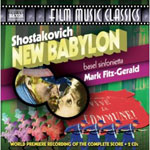 Having
heard only excerpts before, this recording of the complete score
for New Babylon came as a revelation. I really need add
little to Nick Barnard’s very detailed and appreciative review
of this latest in the fine Naxos series of Shostakovich’s film
music. The recording still sounds very well in the inevitably
slightly limited mp3 format. Two small grumbles: the download
resolves itself into two folders, for disc 1 and disc 2, when
it would have been more convenient to have had all the music
in continuous format. More seriously, the booklet which NB praises
is not part of the deal, though you will find detailed notes
‘about this album’ on the web page.
Having
heard only excerpts before, this recording of the complete score
for New Babylon came as a revelation. I really need add
little to Nick Barnard’s very detailed and appreciative review
of this latest in the fine Naxos series of Shostakovich’s film
music. The recording still sounds very well in the inevitably
slightly limited mp3 format. Two small grumbles: the download
resolves itself into two folders, for disc 1 and disc 2, when
it would have been more convenient to have had all the music
in continuous format. More seriously, the booklet which NB praises
is not part of the deal, though you will find detailed notes
‘about this album’ on the web page.
If you want only a 44-minute selection, Chandos come to your
aid with a 1997 performance directed by Valeri Polyansky, coupled
with the song cycle From Jewish Folk Poetry (CHAN9600 – from theclassicalshop.net
in mp3 and lossless sound.) Classicsonline.com have the Capriccio
recording to which NB refers, coupled with Five Days, Five
Nights on C10341/2 – here.
Freebies
of the Month
The Minnesota Symphony Orchestra have made available several
Young People’s Concerts, well worth checking out – here.
To date three concerts are available:
* Musical Tales
* American Riffs
* The Tin Forest
with a fourth slated for release in February 2012.
Beulah
Extra
All December 2011 releases are to be found here.
I’ve already reviewed the Beulah Extra reissue of BRAHMS
German Requiem, Bruno Walter on 4-10BX145
in the November 2011/2 Roundup here.
I’m sorry to say that it did little to reconcile me to the only
piece of music by Brahms and the only Requiem that I know by
any composer that I simply cannot come to terms with.
Wolfgang Amadeus MOZART (1756-1791)
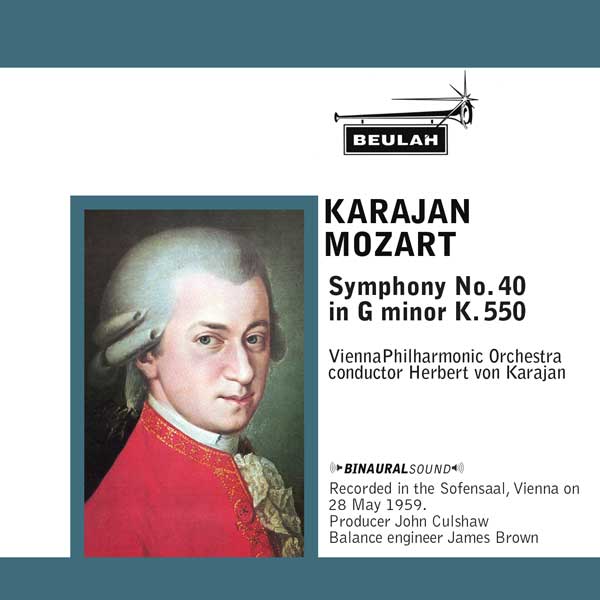 Symphony
No.40 in g minor, K550
Symphony
No.40 in g minor, K550
Vienna Philharmonic Orchestra/Herbert von Karajan – rec. 1959.
ADD/binaural
BEULAH EXTRA 6-9BX18 [24:15]
This was the flip side of the LP on which Karajan’s recording
of Haydn’s Symphony No.104 (London) was released, first
on RCA and then on Decca Ace of Diamonds. Like the Haydn, which
I reviewed in the November 2011/1 Roundup – here – the performance is elegant and poised – a little too ‘controlled’
for some tastes, though I greatly enjoyed hearing both it and
the Haydn again. The playing of the VPO can almost be taken
for granted and John Culshaw’s recording still sounds well.
Wolfgang Amadeus MOZART
Mass No.18 in c minor (Grosse Messe), K427
Wilma Lipp (soprano); Christa Ludwig (mezzo); Murray Dickie
(tenor); Walter Berry (bass)
Vienna Oratorio Choir
Vienna Symphony Orchestra/Ferdinand Grossmann – rec.1958. ADD/stereo
BEULAH EXTRA 1-5BX169 [55:32]
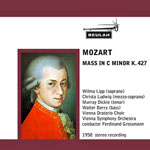 This
recording first appeared in 1958 in mono on the Vox label and
was reissued in stereo on their invaluable £0.99 Turnabout
series ten years later. At the time it more or less had the
field to itself, but that is no longer the case, with fine period
performances from The Sixteen/Harry Christophers (Coro), Christopher
Hogwood (Oiseau Lyre) and John Eliot Gardiner (Philips) prominent
in the catalogue. I also retain considerable affection for Ferenc
Fricsay’s recording on DG Originals.
This
recording first appeared in 1958 in mono on the Vox label and
was reissued in stereo on their invaluable £0.99 Turnabout
series ten years later. At the time it more or less had the
field to itself, but that is no longer the case, with fine period
performances from The Sixteen/Harry Christophers (Coro), Christopher
Hogwood (Oiseau Lyre) and John Eliot Gardiner (Philips) prominent
in the catalogue. I also retain considerable affection for Ferenc
Fricsay’s recording on DG Originals.
The Grossmann remains competitive, however, mainly for the quality
of the solo singing, involving some of the finest Mozartians
of their day. This recording gives us all of the Credo that
Mozart completed in 1782/3, rather than borrowing from his other
masses the sections that Mozart never got round to finishing,
as Mozart himself apparently did, which has since 1958 become
common practice. The sound is not ideal – generally boxy, a
little congested in the busiest passages and the singers a little
recessed at times – but more than tolerable.
Wolfgang Amadeus MOZART
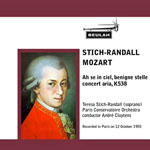 Ah,
se in ciel, benigne stelle, concert aria, K538 [6:49]
Ah,
se in ciel, benigne stelle, concert aria, K538 [6:49]
Bella mia fiamma addio, concert aria, K528 [10:40]
Così fan tutte: Come scoglio [5:40]
Così fan tutte: Per pietà ben mio, perdona
[9:16]
Teresa Stich-Randall; Paris Conservatoire Orchestra/André
Cluytens – rec. 1955. ADD/mono
BEULAH EXTRA 1-4BX 167 [times as above]
These four recordings were made by French EMI in 1955; all except
Bella mia fiamma originally appeared in the UK on 7"
singles. The singing is splendid, the accompaniment sensitive
and the recording still sounds well – better, for example, than
the Vox recording of the Great Mass. Lovers of ethereal singing
have no need to hesitate.
Wolfgang Amadeus MOZART
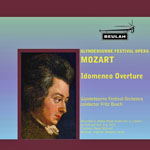 Idomeneo,
Re di Creta, opera seria, K366
Idomeneo,
Re di Creta, opera seria, K366
Overture [4:25]
Act I : Quando avran fine omai – Padre, germani, addio!
[7:05]
Vedrommi intorno l’ombra dolente [3:41]
Act II: Se il padre perdei [4:07]
Fuor del mar [3:49]
Sidonie sponde – Placido è il mar [4:41]
Qual nuovo terrore [5:00]
Act III: Zeffiretti lusinghieri [4:46]
Quartet: Andro ramingo e solo [4:43]
O voto tremendo – Accogli, o re del mar [4:43]
Sena Jurinac (Ilia, soprano), Dorothy McNeil (Elektra, soprano),
Richard Lewis (Idomeneo, tenor), Alexander Young (Idamante,
tenor); Glyndebourne Festival Chorus and Orchestra/Fritz Busch – rec.1951. ADD/mono
BEULAH EXTRA 21-30BX152 [times as above]
These substantial excerpts from Idomeneo were released
on 78s in 1953, by which time they had become a memorial to
Fritz Busch. Reissued on the Electrola label in 1965, they were
still worthy of a recommendation from Philip Hope-Wallace and
they remain an important memento of a memorable production,
singers and, above all, conductor. PH-W uttered the heresy that
highlights might well suffice for Idomeneo and I have
to admit that my complete CD set has been tucked away at the
back of the cupboard for a long time, so I’m not about to demur.
Felix MENDELSSOHN (1809-1847)
Octet for strings, Op.20
Vienna Octet – rec.1953. ADD/mono
BEULAH 1-4BX168 [28:44]
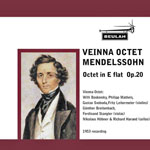 This
may not have quite the classic status of the Clifford Curzon
recording of Schubert’s Trout Quintet with members of
the Vienna Octet which Beulah reissued some time ago, but it
is still very welcome. In 1954 it occupied a whole 12"
LP and cost 36/5 (£1.83, at least £40 in today’s
values). It was the version to have for many years and
it’s still well worth adding to your collection, whatever other
recordings you may have – the excellent recent Resonus download-only
recording of the original version, for example. Compare Beulah’s
asking price of £2.50 and the purchase becomes almost
mandatory. The recording sounds a little muffled but that’s
not a major problem.
This
may not have quite the classic status of the Clifford Curzon
recording of Schubert’s Trout Quintet with members of
the Vienna Octet which Beulah reissued some time ago, but it
is still very welcome. In 1954 it occupied a whole 12"
LP and cost 36/5 (£1.83, at least £40 in today’s
values). It was the version to have for many years and
it’s still well worth adding to your collection, whatever other
recordings you may have – the excellent recent Resonus download-only
recording of the original version, for example. Compare Beulah’s
asking price of £2.50 and the purchase becomes almost
mandatory. The recording sounds a little muffled but that’s
not a major problem.
Jacques OFFENBACH (1819-1890)
Orpheus in the Underworld – excerpts from Act II
The King of the Bœotians [2:44]
Fly Duet [6:12]
Hymn to Bacchus [3:27]
Minuet and Galop [4:11]
June Bronhill, Alan Crofoot, Eric Shilling; Sadler’s Wells Chorus
and Orchestra/Alexander Faris – rec.1960. ADD/stereo.
BEULAH EXTRA 10-13BX143 [timings as above]
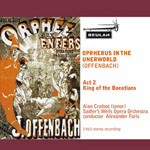 The
Fly Duet appeared on an album entitled Sadler’s Wells
Voices which I reviewed in the October 2011/1 Roundup
(BEULAH 1PD43), but we now have all the excerpts from
Act II which HMV recorded in 1960. I’m not a great fan
of operetta and I was dragged to a slightly later Sadler’s
Wells revival against my will. I enjoyed it so much that I bought
this recording on reel-to-reel tape with all the attendant hiss.
It sounds much better now in Beulah’s transfer.
The
Fly Duet appeared on an album entitled Sadler’s Wells
Voices which I reviewed in the October 2011/1 Roundup
(BEULAH 1PD43), but we now have all the excerpts from
Act II which HMV recorded in 1960. I’m not a great fan
of operetta and I was dragged to a slightly later Sadler’s
Wells revival against my will. I enjoyed it so much that I bought
this recording on reel-to-reel tape with all the attendant hiss.
It sounds much better now in Beulah’s transfer.
Some time ago we had the Overture (1BX143 – see September
2011/1 Roundup)
and, though I had recommended a most inexpensive version on
Past Classics of the complete set of excerpts from this recording,
I felt that Beulah had taken more care over the transfer and
hoped for the rest of the contents of the LP. The fact that
these Act II excerpts are numbered 10-13BX143 leads me to hope
that we shall have the remainder on 2-9BX143 in due course.
Meanwhile listen to what we have and enjoy.
Camille SAINT-SAËNS (1835-1921)
Symphony No.3 in c minor, Op.78 (Organ Symphony)
Berj Kamkochian (organ); Leo Litwin, Bernard Zighera (pianos);
Boston Symphony Orchestra/Charles Munch – rec.1959. ADD/stereo
BEULAH 13-14BX32 [34:45]
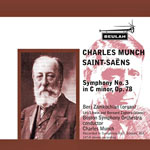 In
1960 this recording on LP cost almost £2, around £50
today; even when reissued as an RCA Victrola LP in the late
1960s at £0.99, the equivalent would be at least £20
in today’s values, so Beulah’s asking price of £2.50 is
very reasonable. There are some excellent recent recordings
in all price categories, but the Munch performance and recording
remain as recommendable now as then – no less a reviewer than
Trevor Harvey rated Munch only a little less highly than Toscanini – and the sound was demonstration quality for its time. No need
for hesitation when the only other way to obtain this classic
recording is on a 2-CD set (RCA 74321987152).
In
1960 this recording on LP cost almost £2, around £50
today; even when reissued as an RCA Victrola LP in the late
1960s at £0.99, the equivalent would be at least £20
in today’s values, so Beulah’s asking price of £2.50 is
very reasonable. There are some excellent recent recordings
in all price categories, but the Munch performance and recording
remain as recommendable now as then – no less a reviewer than
Trevor Harvey rated Munch only a little less highly than Toscanini – and the sound was demonstration quality for its time. No need
for hesitation when the only other way to obtain this classic
recording is on a 2-CD set (RCA 74321987152).
Those seeking to explore Saint-Saëns’ symphonies further
will find the most recent reissue of Jean Martinon’s
complete cycle on EMI Masters a real bargain at £7.99
from classicsonline.com.
(Stream from the Naxos Music Library.) Nos. 1-3 come with the
unnumbered Symphony in A and Symphony in F (Urbs Roma)
on a 2-CD set, 5099963180459. With a version of No.3
to rival the best, including Munch, this set offers two and
a half hours of delight.
Antonín DVOŘÁK
(1841-1904)
Slavonic Dances: Op.46, No.1 in C [4:03]; No.2 in e minor [5:06];
No.3 in A flat [5:08] and Op.72 No.8 (No.16) in A flat [6:08]
Hamburg Radio Symphony Orchestra/Hans Schmidt-Isserstedt – rec.1953.
ADD/mono
BEULAH EXTRA 8-11BX144 [timings as above]
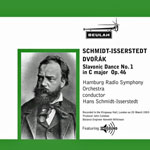 Schmidt-Isserstedt
recorded the complete Op.46 set and the last of the Op.72 set
for Decca; the four listed above were originally issued on a
10" LP in 1953 and subsequently in tandem with his classic
recording of the Seventh Symphony. The playing is brilliant
and the John Culshaw recording still sounds well in these transfers.
Even if you followed my recommendation and bought the complete
Channel Classics recording directed by Iván Fischer (CCSSA90210 – see November 2011/1 Roundup)
and/or you have the classic Szell recording, you should add
these versions to your collection. They make a fine pendant
to Beulah’s reissues of Schmidt-Isserstedt’s recordings of the
Brahms Hungarian Dances (1-7BX144 – see June 2011/1 Roundup).
Schmidt-Isserstedt
recorded the complete Op.46 set and the last of the Op.72 set
for Decca; the four listed above were originally issued on a
10" LP in 1953 and subsequently in tandem with his classic
recording of the Seventh Symphony. The playing is brilliant
and the John Culshaw recording still sounds well in these transfers.
Even if you followed my recommendation and bought the complete
Channel Classics recording directed by Iván Fischer (CCSSA90210 – see November 2011/1 Roundup)
and/or you have the classic Szell recording, you should add
these versions to your collection. They make a fine pendant
to Beulah’s reissues of Schmidt-Isserstedt’s recordings of the
Brahms Hungarian Dances (1-7BX144 – see June 2011/1 Roundup).
John Philip SOUSA (1854-1932)
Twelve Marches
Sound Off [2:51]
Nobles of the Mystic Shrine (1923) [3:25]
Sabre and Spurs [2:59]
The Picadore [2:52]
Our Flirtation [2:38]
High School Cadets (1890) [2:35]
The Invincible Eagle (1901) [3:29]
Bullets and Bayonets [3:29]
Liberty Bell (1893) [3:27]
Riders of the Flag [2:21]
Solid Men to the Post [3:49]
The Rifle Regiment [3:16]
Eastman Wind Ensemble/Frederick Fennell – rec.1960. ADD/stereo
BEULAH EXTRA 1-12BX182 [timings as above]
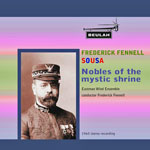 The
Mercury SACD Fennell conducts Sousa, containing 24 marches,
seems to be in short supply in the UK, making it something of
a collectors’ item, selling for over £30, so the Beulah
reissues are very welcome. Sousa’s music is a paragon of its
kind and Fennell’s performances are classics – almost legendary.
The Mercury recording still sounds extremely well in these transfers.
Strongly recommended to fans of martial music and recommended
to everyone else except those allergic to the genre – and to
those who can’t help thinking Monty Python thoughts when
listening to Liberty Bell.
The
Mercury SACD Fennell conducts Sousa, containing 24 marches,
seems to be in short supply in the UK, making it something of
a collectors’ item, selling for over £30, so the Beulah
reissues are very welcome. Sousa’s music is a paragon of its
kind and Fennell’s performances are classics – almost legendary.
The Mercury recording still sounds extremely well in these transfers.
Strongly recommended to fans of martial music and recommended
to everyone else except those allergic to the genre – and to
those who can’t help thinking Monty Python thoughts when
listening to Liberty Bell.
As well as the twelve Sousa tracks, Beulah have reissued Fennell’s
equally fine 1957 recordings of Robert
Browne HALL Officer of the Day (13BX182)
[2:23] and David W REEVES Second
Regiment Connecticut National Guard March, a work which
Sousa himself wished he had written (14BX182) [2:53].
George GERSHWIN (1898-1937) An
American in Paris
New York Philharmonic Orchestra/Leonard Bernstein – rec. 1959
ADD/stereo
BEULAH EXTRA 2BX76 [18:07]
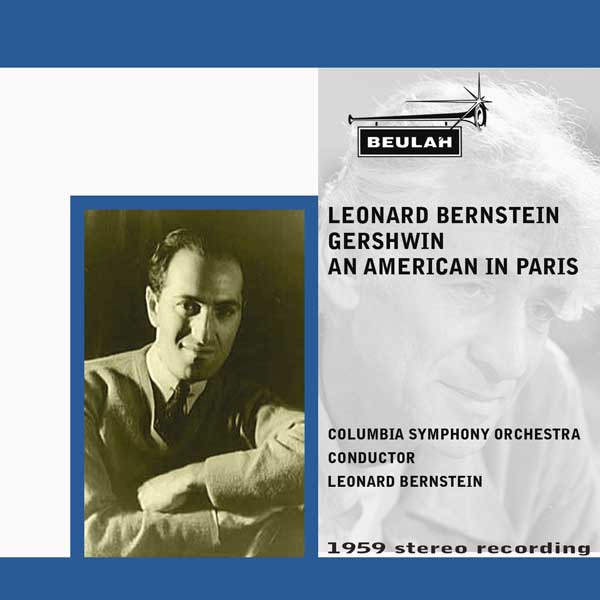 This
is very much self-recommending – Gershwin as his music ought
to be played, without over-egging the jazz elements but equally
without trying to present the music in a straight symphonic
manner: Bernstein gets the balance just right. With a recording
which still sounds excellent in the Beulah transfer – no hint
that the current Gramophone Guide is right to label this
‘historical’ and better than the CBS CD in my collection – this
is my pick of this month’s Beulah reissues, closely followed
by the Saint-Saëns.
This
is very much self-recommending – Gershwin as his music ought
to be played, without over-egging the jazz elements but equally
without trying to present the music in a straight symphonic
manner: Bernstein gets the balance just right. With a recording
which still sounds excellent in the Beulah transfer – no hint
that the current Gramophone Guide is right to label this
‘historical’ and better than the CBS CD in my collection – this
is my pick of this month’s Beulah reissues, closely followed
by the Saint-Saëns.
I have just one problem: Beulah give the orchestra as the Columbia
Symphony Orchestra whom Bernstein definitely conducted in Rhapsody
in Blue on the original release (Philips SABL160 in the
UK) but I believe that the orchestra for American was
the NYPO, as stated above.
***
Christmas Music from Medieval and Renaissance
Europe
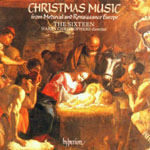 Puer
natus est nobis (Plainsong: Introit for Mass of the Nativity)
[3:06]
Puer
natus est nobis (Plainsong: Introit for Mass of the Nativity)
[3:06]
ANONYMOUS Nowell, nowell: In Bethlem [2:16]
TRADITIONAL (C15th) Gaudete [1:25]
Walter LAMBE (c.1450-c.1500)
Nesciens Mater [4:52]
TRADITIONAL Qui creavit cælum [3:09]
TRADITIONAL The Song of the Nuns of Chester [3:09]
TRADITIONAL Coventry Carol [3:22]
TRADITIONAL The Boar’s Head Carol [1:27]
Thomas TALLIS (c.1505-1585)
Videte miraculum [9:48]
TRADITIONAL Quem pastores laudavere [2:17]
Jakob HANDL (1550-1591) Pueri,
concinite [1:52]
O magnum mysterium [2:22]
Resonet in laudibus [1:19]
TRADITIONAL In dulci jubilo [2:46]
TRADITIONAL Riu, riu chiu [2:15]
Jean MOUTON (1459-1522) Nesciens
Mater [5:49]
Orlandus LASSUS (1532-1594)
Omnes de Saba [3:20]
The Sixteen/Harry Christophers – rec.1987. DDD.
pdf booklet with texts and translations included.
HYPERION CDA66263 [52:41] – from
hyperion-records.co.uk (mp3 and lossless)
 This
album of music from the late medieval and renaissance periods
is neatly divided between English (the first half) and continental
European works. Much of this varied anthology is quite well
known but there is enough here that isn’t to make it worthwhile.
The performances are stylish and idiomatic, the booklet and
recording excellent. Though the CD remains at full price, the
download is offered at £5.99.
This
album of music from the late medieval and renaissance periods
is neatly divided between English (the first half) and continental
European works. Much of this varied anthology is quite well
known but there is enough here that isn’t to make it worthwhile.
The performances are stylish and idiomatic, the booklet and
recording excellent. Though the CD remains at full price, the
download is offered at £5.99.
Feliz Navidad – Mediterranean Christmas Music
from the Renaissance
ANONYMOUS (Cancionero de Uppsala) Dadme albrícias
[2:08]
Bartolomeo TROMBONCINO (1470-1535)
Ostinato vo sequiré [2:15]
ANONYMOUS (Cancionero de Uppsala) Yo me soy la morenica
[2:28]
Bella de vos son amoros [3:13]
Vos virgen soys nuestra madre [2:12]
No la devemos dormer [1:59]
Un niño nos es nasçido [1:45]
Verbum caro factum est [1:33]
Francisco GUERRERO (1528-1599)
Ave virgo sanctissima [2:25]
ANONYMOUS (Cancionero de Colombina) Reyna muy esclarescida
[1:53]
ANONYMOUS (Cancionero de Uppsala) Alta Reina soberana
[1:42]
Sebastiano FESTA (14??-1524)
Vergine sacra [2:14]
ANONYMOUS (Cancionero de Uppsala) Señores el
ques nasçido [1:22]
ANONYMOUS (Cancionero de Colombina) A los maytines
era [3:05]
Qué bonito Niño chiquito! [3:35]
ANONYMOUS (Cancionero de Uppsala) Falalalan falalala
[2:08]
NEAPOLITAN TRADITIONAL Quando nascette nino [3:06]
ANONYMOUS (Cancionero de Uppsala) Que farem del pobre
Joan [1:56]
Francisco GUERRERO A
un niño llorando al hielo [3:24]
ANONYMOUS (Cancionero de Uppsala ) Rey a quien reyes
adoran [1:58]
Pedro ESCOBAR (1465-1535)
Virgen bendita sin par [1:49]
Francisco GUERRERO Pastores
si nos queries [1:56]
ANONYMOUS (Cancionero de Uppsala) Riu, riu Chiu la
guarda ribera [3:25]
Francisco GUERRERO Los
Reyes siguen la estrella [2:54]
Rossino MANTOVANO (early 16thcentury)
Lirum bilirum lirum lirum [1:48]
Francisco GUERRERO Al
resplandor d’ una estrella [3:24]
ANONYMOUS (Cancionero de Uppsala) E la don don [4:03]
Cécile Kempenaers (soprano); José Pizarro (tenor)
Capella de la Torre/Katharina Bäuml – rec. March 2008.
DDD.
COVIELLO CLASSICS COV20811 [65:53] -from eclassical.com
(mp3 and lossless)
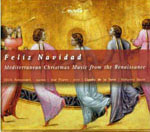
 I
reviewed the parent CD two years ago – here
– and I’m glad to make the acquaintance of these performances
again as a download. Most of this is unfamiliar territory, apart
from the now ubiquitous Riu, riu, chiu, which receives
a really rousing performance, and Lirum, bilirum. You’ll
probably also recognise Quando nascette nino as the inspiration
for Handel’s ‘He shall lead his flock’ in Messiah.
Everything here is folk or folk-inspired – Renaissance
peasants really knew how to let their hair down at Christmas
and their modern interpreters do them proud. The recording is
bright and cheerful to match – it’s a pity that there
are no texts; these come with the CD, over which the download
represents a considerable saving.
I
reviewed the parent CD two years ago – here
– and I’m glad to make the acquaintance of these performances
again as a download. Most of this is unfamiliar territory, apart
from the now ubiquitous Riu, riu, chiu, which receives
a really rousing performance, and Lirum, bilirum. You’ll
probably also recognise Quando nascette nino as the inspiration
for Handel’s ‘He shall lead his flock’ in Messiah.
Everything here is folk or folk-inspired – Renaissance
peasants really knew how to let their hair down at Christmas
and their modern interpreters do them proud. The recording is
bright and cheerful to match – it’s a pity that there
are no texts; these come with the CD, over which the download
represents a considerable saving.
Marc-Antoine CHARPENTIER (1643-1704)
Te Deum, H.146 (1692) [22:05]
Dixit Dominus, H.204 (1690) [8:58]
Messe de Minuit pour Noël, H.9 (1694) [28:47]
Jane Archibald, Michele de Boer, Anne L’Espèrance
(sopranos); Marion Newman, Nancy Reynolds (altos); Colin Ainsworth,
James McLennan, David Nortman (tenors); Giles Tomkins, Esteban
Cambre (basses)
Aradia Ensemble/Kevin Mallon – rec. 2003. DDD
pdf booklet with texts and translations included.
NAXOS 8.557229 [59:50] – from classicsonline.com
(mp3)
[see reviews by Paul Shoemaker – here
– and Robert Hugill – here.]
Noëls and Christmas Motets, Volume 1
Noel: A minuit fut fait un reveil, H.9 [6:14]
Noel: A la venue de Noel, H.531 [1:23]
Noel: Ou s’en vont ces gais bergers? H.534 [1:41]
Noel: Joseph est bien marié (orchestra and organ),
H.534 [5:32]
In nativitatem Domini canticum, H.314 [4:50]
Noel: Or nous dites Marie, H.534 [7:30]
Noel: Vous qui désirez sans fin, H.534 [2:26]
Noel: O Créateur, H.531 [2:46]
Canticum in nativitatem Domini, H.393 [8:42]
Noel: Laissez paistre vos bêtes, H. 534 [2:36]
Noel: Une jeune pucelle (soloist, orchestra and organ),
H.534 [4:27]
Noel: Les bourgeois de Chatres, H.534 [2:47]
Chanson, from In nativitatem Domini canticum,
H.416 [2:59]
In nativitatem D(omini) N(ostri) J(esu) C(hristi), H.414
[16:14]
Aradia Ensemble/Kevin Mallon – rec. 1999. DDD
pdf booklet with texts and translations included.
NAXOS 8.554514 [70:09] – from classicsonline.com
(mp3)
Noëls and Christmas Motets, Volume 2
Noël: un flambeau, Janette, Isabelle! (H.460c) (Soloists
and Organ) 3:18
Dialogus inter angelos et pastores Judeæ in nativitatem
Domini (H.420) 20:40
Noël: un flambeau, Janette, Isabelle! (H.460c) (Choir)
2:25
In nativitatem Domini canticum (H.416) 32:54
Noël: un flambeau, Janette, Isabelle! (H.460c) (instrumental)
2:54
Tracy Smith Bessette (soprano); Christine Stelmacovitch (alto);
David Nortman (tenor);
Curtis Streetman (bass); Aradia Ensemble/Kevin Mallon –
rec. 2001. DDD
NAXOS 8.557036 [62:12] – from classicsonline.com
(mp3)
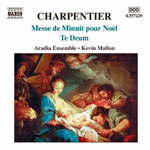
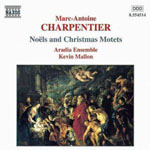

 Naxos
have done very well by Charpentier, with recordings from Le
Concert Spirituel/Hervé Niquet and Aradia/Kevin Mallon,
including these recordings of some of his oodles of Christmas
music. The Midnight Mass of the Nativity is based on traditional
French Noëls, vocal and instrumental settings of
which were something of a seventeenth-century speciality, as
witness a Hyperion Helios CD of Daquin’s Noëls
for organ which I reviewed
some time ago (CDH55319). The first album listed above offers
stylish, period-aware performances of the Midnight Mass and
the best known of Charpentier’s Te Deums and that’s
probably the place to start if you have yet to make the serious
acquaintance of this composer. The mp3 recording is fine apart
from a couple of small blips at the start of tracks. Then you
can turn to the other two albums where you’ll recognise
many of the Noëls which he borrowed, in slightly
less elaborate but still very enjoyable settings.
Naxos
have done very well by Charpentier, with recordings from Le
Concert Spirituel/Hervé Niquet and Aradia/Kevin Mallon,
including these recordings of some of his oodles of Christmas
music. The Midnight Mass of the Nativity is based on traditional
French Noëls, vocal and instrumental settings of
which were something of a seventeenth-century speciality, as
witness a Hyperion Helios CD of Daquin’s Noëls
for organ which I reviewed
some time ago (CDH55319). The first album listed above offers
stylish, period-aware performances of the Midnight Mass and
the best known of Charpentier’s Te Deums and that’s
probably the place to start if you have yet to make the serious
acquaintance of this composer. The mp3 recording is fine apart
from a couple of small blips at the start of tracks. Then you
can turn to the other two albums where you’ll recognise
many of the Noëls which he borrowed, in slightly
less elaborate but still very enjoyable settings.
The music is performed at baroque pitch. All the singing is
deliciously clear-toned and forthright, the accompaniments on
period instruments are stylish and the whole is enthusiastically
presented. Two of the discs come with documentation but, sadly,
the third doesn’t and it’s not one of the Naxos CDs
for which libretti are offered online.
The Erato recording of the Messe de Minuit by William
Christie which PS mentions in his review of the Messe de
Minuit and which many may prefer is available from amazon.co.uk
for £2.79 – here.
Hmvdigital.com and classicsonline.com offer the less authentic
but enjoyable King’s College/Willcocks version for £7.99,
but you should be able to find the EMI Encore CD for less than
that.
Music for the Virgin Mary: Celebrating 300 years of Marc-Antoine
CHARPENTIER (1643-1704)
Nicholas-Antoine LEBÈGUE
(c.1631-1702) Prélude du cinquième ton
(C major) [1:14]
Queen of Heaven
Marc-Antoine CHARPENTIER Antiphon
Ave Regina cœlorum H.19 [3.07]
The Birth of The Virgin
Marc-Antoine CHARPENTIER Motet
Sicut spina rosam H.309 [2.26]
Motet Gaude felix Anna H.315 (FN, GR) [1.50]
Nicholas-Antoine LEBÈGUE
Tierce en taille du deuxième ton (g minor) [3.22]
The Salutation
Guillaume-Gabriel NIVERS (c.1632-1714)
Antiphon Gabriel Angelus
Marc-Antoine CHARPENTIER
Magnificat pour le Port Royal H.81 [10:00]
Antiphon Alma redemptoris mater H.21 [3.03]
The Nativity of Christ
Marc-Antoine CHARPENTIER Motet
Frigidae noctis umbra totum H.421 [11.16]
In Nativitate Domini N(ost)ri Jesu Christi Canticum
Nicholas-Antoine LEBÈGUE
Noël: Où s’en vont ces gays bergers? [2.35]
A Prayer to The Virgin
Attrib. Jean Baptiste LULLY (1632-687)
Antiphon Salve Regina [7.12]
Guillaume-Gabriel NIVERS
Récit de cromorne du troisième ton (a minor)
[3.24]
The Passion
Marc-Antoine CHARPENTIER
Sequence Stabat Mater pour les religieuses H.15) [9.09]
Guillaume-Gabriel NIVERS
Dialogue à deux choeurs du sixième ton (F
major) [2.26]
The Resurrection
Marc-Antoine CHARPENTIER
Antiphon Regina cœli lætare H.32 [2.38]
The Coronation of The Virgin
Marc-Antoine CHARPENTIER
Hymn Gaudia Virginis Mariæ H.59 [3.15]
Nicholas-Antoine LEBÈGUE Plein
Jeu du huitième ton (G major) [2.01]
Concerto delle Donne (Donna Deam, Faye Newton, Gill Ross, Miriam
Allan, Caroline Ashton, Rachel Bevan, Jennie Cassidy, Charlotte
Fairbairn, Ana Gabriela Schwedhelm (sopranos))
Directed by Alastair Ross (organ) – rec. 2005. DDD
pdf booklet with texts included at classicsonline.com and Naxos
Music Library.
SIGNUM SIGCD073 [69:00] – from eclassical.com
(mp3 or lossless) classicsonline.com (mp3) or stream from Naxos
Music Library
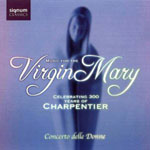
 Beautifully
clear-toned singing by all-soprano soloists of music by Charpentier
and his contemporaries, released slightly belatedly for the
tercentenary of his death in 2004. The reasonably well-known
Magnificat for the nuns of the Port Royal (not the outpost
of Jansenism but another by the same name) receives the most
beautiful performance that I’ve ever heard – preferable
even to the very good Hervé Niquet recording on Naxos.
The tonal beauty of the singing meant that I was less worried
than Chris Bragg about the slight blandness but I certainly
agree with his overall warm recommendation – see review.
Only classicsonline.com offer the booklet but eclassical.com
offer 16-bit lossless at the same price as mp3 and that price
($12.41) is on a par with the £7.99 charged by classicsonline.com.
Beautifully
clear-toned singing by all-soprano soloists of music by Charpentier
and his contemporaries, released slightly belatedly for the
tercentenary of his death in 2004. The reasonably well-known
Magnificat for the nuns of the Port Royal (not the outpost
of Jansenism but another by the same name) receives the most
beautiful performance that I’ve ever heard – preferable
even to the very good Hervé Niquet recording on Naxos.
The tonal beauty of the singing meant that I was less worried
than Chris Bragg about the slight blandness but I certainly
agree with his overall warm recommendation – see review.
Only classicsonline.com offer the booklet but eclassical.com
offer 16-bit lossless at the same price as mp3 and that price
($12.41) is on a par with the £7.99 charged by classicsonline.com.
Michael PRÆTORIUS (c.1571-c.1621)
Puer natus in Bethlehem: Renaissance Christmas Music
Hosianna dem Sohne David (à 5) [0:49]
Nun komm der Heiden Heiland et al. [7:50]
Hört zu ihr lieben Leute et al. [2:55]
Meine Seel erhebt den Herren (à 6) [8:18]
Psallite, unigenito (à 4) [0:52]
En natus est Emanuel (à 4) [1:12]
In natali Domini (à 4) [1:09]
Vom Himmel hoch da komm ich her et al. [8:55]
Als Christus geboren war (à 4) et al. [2:45]
Resonet in laudibus (à 6) [2:58]
Joseph, lieber Joseph mein (à 3) [2:45]
Deo laus et gloria (à 5) [1:18]
In dulci gloria et al. [3:32]
Ein Kind geborn zu Bethlehem et al. [3:28]
Magnificat super Ecce Maria et Sydus ex claro et al.
[9:11]
Der Morgenstern ist aufgedrungen et al. [1:58]
Wie schön leuchtet der Morgenstern et al. [4:28]
Viva Voce ((Heidrun Luchterhandt, Undine Holzwarth (soprano);
Werner Buchin (alto); Achim Kleinlein, Martin Post (tenor);
Michael Pannes (bass))
André Henrich (chitarrone and archlute)
Christof Pannes (organ) – rec. 1999. DDD.
pdf booklet with texts and translations included.
BIS-CD-1035 [66:09] – from eclassical.com
(mp3 and lossless) or stream from Naxos Music Library
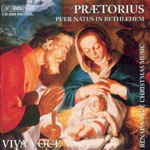
 Unlike
the Hyperion Helios collection which I reviewed in the November
2011/2 Roundup – here
– this is simply a collection of Prætorius’
vocal music for the Christmas season, without any interpolations
from Terpsichore. That will be an advantage for the many
collectors who already have a recording of that wonderful dance
music, such as David Munrow’s ground-breaking collection,
now available on a super-budget 2-CD Virgin Veritas set with
dance music by Susato and Morley, etc. (35000032 – around
£7.50 in the UK).
Unlike
the Hyperion Helios collection which I reviewed in the November
2011/2 Roundup – here
– this is simply a collection of Prætorius’
vocal music for the Christmas season, without any interpolations
from Terpsichore. That will be an advantage for the many
collectors who already have a recording of that wonderful dance
music, such as David Munrow’s ground-breaking collection,
now available on a super-budget 2-CD Virgin Veritas set with
dance music by Susato and Morley, etc. (35000032 – around
£7.50 in the UK).
If the absence of the dances makes this seem a little less robust
than other collections, the gain in elegance largely makes up.
There’s actually more music on the album than the list
above would indicate: the et al in the titles indicates
that BIS have grouped several pieces together on each track.
With good recording (mp3 and lossless at the same reasonable
price of $7.73 from eclassical.com) and notes and texts as part
of the deal – from eclassical.com only, not from the Naxos
Music Library or classicsonline.com – this is well worth
consideration.
Dieterich BUXTEHUDE (1647-1707)
Une alchimie musicale
O dulcis Jesu BuxWV83 [10:51]
Ciacona BuxWV160 [4:23]
O clemens BuxWV82 [7:20]
Præludium BuxWV163 [6:55]
Fallax mundus BuxWV28* [9:30]
Sonata BuxWV266 [8:35]
O Gottes Stadt BuxWV87 [9:14]
Passacaglia BuxWV161 [5:16]
Fried- und freudenreiche Himmelfahrt: Klag-lied BuxWV76/2
[8:16]
Raphaële Kennedy (soprano)
Da Pacem/Raphaële Kennedy and Pierre-Adrien Charpy –
rec. 2010? DDD.
* first recording
pdf booklet with texts and translations available from K617
website – here.
K671 K617227 [70:16] – from emusic.com
(mp3)
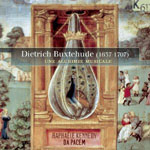 This
is not festive Christmas music – indeed, the closing Klaglied
is funereal in a beautiful way – but I couldn’t resist
its charms, not least because it contains the first recording
of Fallax mundus: the album is justly subtitled Musical
Alchemy. All concerned were new to me, but I shall look
out for future offerings. Ms Kennedy, who sings and co-directs,
has a voice approaching the purity of Emma Kirkby; she sings
affectively and she is very ably abetted by the musicians of
Da Pacem on reproduction period instruments. The vocal items
are interspersed with instrumental interludes.
This
is not festive Christmas music – indeed, the closing Klaglied
is funereal in a beautiful way – but I couldn’t resist
its charms, not least because it contains the first recording
of Fallax mundus: the album is justly subtitled Musical
Alchemy. All concerned were new to me, but I shall look
out for future offerings. Ms Kennedy, who sings and co-directs,
has a voice approaching the purity of Emma Kirkby; she sings
affectively and she is very ably abetted by the musicians of
Da Pacem on reproduction period instruments. The vocal items
are interspersed with instrumental interludes.
Emusic.com never offer booklets but you can follow the link
above to K617’s website where you will find an excellent
example. The recording is transferred at around 220kb/s –
not ideal, but adequate. At £3.78 or less, this won’t
take up too much of your monthly allowance from emusic.com.
Those without access to emusic.com will find it at amazon.co.uk
for £7.49.
George Frideric HANDEL (1685-1759)
Handel in Hamburg
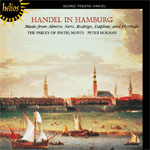 Suite
from Almira (1705)* [13:30]
Suite
from Almira (1705)* [13:30]
Suite, possibly from Nero (1705)* [9:21]
Oboe Concerto in g minor (?1703-5) [8:01]
Suite from Florindo and Daphne (?1705/6) [15:50]
Overture in b flat from Rodrigo (?1706) [16:31]
The Parley of Instruments/Peter Holman – rec.1997. DDD.
* reconstructed by Peter Holman. First recording.
pdf booklet included.
HYPERION HELIOS CDH55324 [63:36] – from hyperion-records.co.uk
(mp3 and lossless)
This is due for reissue on CD in January 2012 but downloaders
need not wait; it’s available now. I can’t claim that
there’s anything of great profundity here but at its new
price this entertaining and award-winning reconstruction of
some of the music which the youthful Handel wrote in Hamburg
is well worth having.
George Frideric HANDEL (1685-1759)
Utrecht Te Deum, HWV278 (1713) [24:12]
Utrecht Jubilate, HWV279 (1713) [17:44]
William CROFT (1678 – 1727)
Ode for the Peace of Utrecht (‘With Noise of Cannon’)
[30:50]
(World premiere recording)
Nicki Kennedy (soprano); William Towers (alto); Wolfram Lattke,
Julian Podger (tenors); Peter Harvey (bass)
The Netherlands Bach Society/Jos van Veldhoven – rec.2009?
DDD/DSD.
Pdf booklet with texts included
CHANNEL CLASSICS CCSSA29610 [72:46] – from channelclassics.com
(mp3, 16- and 24-bit lossless)
I have no new recordings of Messiah for you this Christmas;
though there are several new releases, none has yet come my
way, so my existing recommendations stand:
* Coro – The Sixteen/Harry Christophers (November 2008
Roundup
and December 2008 Roundup)
* Linn – Dunedin Consort/John Butt (Recording of the Month:
see review
by Michael Greenhalgh and November 2009 Roundup)
* Hyperion – The Sixteen/Harry Christophers (Budget recommendation;
December 2009 Roundup)
* Hyperion – Polyphony; Sinfonia/Stephen Layton –
see review of CDs by John Quinn – here
– and myself – here.
Download from hyperion-records.co.uk
(mp3 and lossless, 2-for-the-price-of-1)
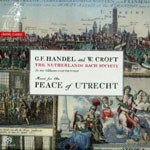 Instead,
rather than let Handel pass us by, I’m recommending a recent
Channel Classics recording of the music written by Handel and
Croft to celebrate the Pease of Utrecht which we seem to have
missed.
Instead,
rather than let Handel pass us by, I’m recommending a recent
Channel Classics recording of the music written by Handel and
Croft to celebrate the Pease of Utrecht which we seem to have
missed.
The new recording safely replaces the earlier version on Hyperion
Helios CDH55359 which I reviewed with some reservations in the
August 2010 Roundup.
Who better, indeed, than the Netherlands Bach Society to sing
the music composed for a treaty signed in their country? More
than that, however, the performers are good enough actually
to manage to convince me that these two works are worthy to
stand alongside the Dettingen Te Deum. (DGG/Pinnock –
see November 2009 Roundup and Hyperion CDA6768, Trinity College
Choir, Cambridge; Academy of Ancient Music/Stephen Layton, from
hyperion-records.co.uk
in mp3 and lossless – see review).
The Croft coupling is more than just interesting – I’m
pleased to see Channel Classics adding to what Hyperion have
already done to make us aware that he composed more than just
a Purcell-like setting of the Burial Service. With an excellent,
attractively illustrated booklet and top-rate recording –
I chose the 24/96 version, which sits mid-way between the decent
320k mp3 and the audiophile 24/192 – this may not be seasonal
music but it is strongly recommended.
Johann Sebastian BACH (1685-1750)
Vier Klavierkonzerte
Keyboard Concerto No.7 in g minor, BWV1058 [14:37]
Keyboard Concerto No.1 in d minor, BWV1052 [22:31]
Keyboard Concerto No.2 in E, BWV1053 [19:21]
Keyboard Concerto No.4 in A, BWV1055 [15:04]
Peter Seivewright (piano); Scottish Baroque Soloists/Angus Ramsay
DIVINE ART DDA25030 [71:34] – from theclassicalshop.net
(mp3 and lossless)
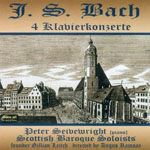 Regular
readers will be aware that I am firmly of the opinion that Bach
should not be played on the modern piano unless your name happens
to be Glenn Gould or Angela Hewitt. Would this recent recording
from Divine Art be good enough to persuade me otherwise? In
the event I found it frustratingly a curate’s egg.
Regular
readers will be aware that I am firmly of the opinion that Bach
should not be played on the modern piano unless your name happens
to be Glenn Gould or Angela Hewitt. Would this recent recording
from Divine Art be good enough to persuade me otherwise? In
the event I found it frustratingly a curate’s egg.
The performers here certainly don’t try to overwhelm the
music in a large-scale manner, with clean and stylish playing,
especially in the outer movements. They do, however, make the
slow movements too affective for my liking: though they take
just 6:29 for the slow movement of BWV1058 against Hewitt’s
6:34, the lack of forward momentum makes the music sound
slower in a manner which I found rather painful. The finale
makes some amends and the opening movement of BWV1052 does so
even more, making me wish that everything here had as much life
and rhythm. If only the whole set had been this good …
Peter Seivewright’s performances of baroque music on the
piano divide critical opinion, as witness a MusicWeb review
of his Galuppi by David Wright who awarded 4 stars and Peter
Grahame Woolf who gave just two (DDA25006 – see review).
I imagine that there will be many who enjoy his Bach for those
very over-affective slow movements which I dislike. If you think
that may apply to you, you may wish to wait for this album to
appear in the Naxos Music Library to try it there first –
it hadn’t yet done so at the time of writing..
For me, however, if you want Bach on the piano, you can’t
do better than Hewitt whose versions of four concertos on Hyperion
CDA30003 make an excellent introduction, while aficionados will
want her complete Bach on CDS44421/35, both reviewed in the
October 2010 Roundup,
the latter as Download of the Month.
Johann Sebastian BACH (1685-1750)
Christmas Oratorio, BWV248 (1734)
Barbara Schlick (soprano); Michael Chance (alto); Howard Crook
(tenor); Peter Kooy (bass); Collegium Vocale Gent Chorus and
Orchestra/Philippe Herreweghe – rec. 1989. DDD.
VIRGIN CLASSICS VERITAS 5099909633452 [2 CDs: 2:28:27]
– from classicsonline.com
(mp3) or stream from the Naxos Music Library
[‘Herreweghe’s account of the Christmas Oratorio
is as authoritative as any.’ – see full review
by Gavin Dixon.]
[‘The Christmas Oratorio contains some of Bach’s
finest arias, and the two-and-a-half hours of music on these
two discs is delightful.’ – see full review
of 6-CD Herreweghe collection by Kirk McElhearn.]
Christmas Oratorio, BWV248 (1734)
Monika Frimmer (soprano); Yoshikazu Mera (counter-tenor); Gerd
Türk (tenor); Peter Kooij (bass)
Bach Collegium Japan/Masaaki Suzuki – rec. c.1997 DDD.
BIS BIS-CD-941/42 [2 CDs: 2:24:50] – from classicsonline.com
(mp3) or stream from Naxos Music Library
The Christmas Oratorio is actually a series of six cantatas
for the Christmas-New Year-Epiphany cycle at Leipzig in 1734/5.
As usual, some of the music was recycled from Bach’s other
works – at first hearing the re-use of the Passion music
O Haupt voll Blut und Wunden in a work intended for Christmas
seems somewhat bizarre.
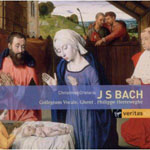
 The
Herreweghe recording is the least expensive recommendable
download version that I know of – but be sure to choose
the option to which I’ve given a link above, at £6.99:
classicsonline.com also offer the same recording for £14.99.
Occasional passages could have been better done but the whole
adds up to a fine performance, well recorded and offered in
decent mp3 sound. Even played in mid November, this was a sheer
delight to listen to. There are no notes, but these are usually
rudimentary with Virgin and EMI Classics budget twofers and
the texts and translations are easily available online.
The
Herreweghe recording is the least expensive recommendable
download version that I know of – but be sure to choose
the option to which I’ve given a link above, at £6.99:
classicsonline.com also offer the same recording for £14.99.
Occasional passages could have been better done but the whole
adds up to a fine performance, well recorded and offered in
decent mp3 sound. Even played in mid November, this was a sheer
delight to listen to. There are no notes, but these are usually
rudimentary with Virgin and EMI Classics budget twofers and
the texts and translations are easily available online.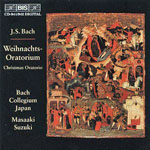
I do, however, think that few listeners will begrudge paying
a little extra for the Suzuki version which has already
achieved classic status. The recording, in 320kb/s mp3, does
justice to the original. I was surprised not to find a lossless
equivalent on offer at eclassical.com which I have come to regard
as the ‘home’ of BIS downloads in mp3 and flac, at
a keen price, too, but the classicsonline.com version will do
well enough.
Neither version comes with notes but the BIS website lists the
individual tracks and their incipits – here.
Johann Sebastian BACH (1685-1750)
Cantatas from Leipzig 1724 – Volume 26
Cantata BWV 180, Schmücke dich, O liebe Seele (20th
Sunday after Trinity) [21:18]
Cantata BWV 122, Das neugeborne Kindelein (Sunday after
Christmas) [13:19]
Cantata BWV 96, Herr Christ, der einge Gottessohn (18th
Sunday after Trinity) [17:14]
Yukari Nonoshita (soprano)
Timothy Kenworthy-Brown (counter-tenor)
Makoto Sakurada (tenor)
Peter Kooij (bass)
Bach Collegium Japan, Chorus and Orchestra/Masaaki Suzuki –
rec. 2003 DDD
pdf booklet with texts and translations included
BIS CD-1401 [52:57] – from eclassical.com
(mp3 and lossless) or stream from Naxos Music Library
[‘Highly recommended’ – see review
by Michael Cookson.]
Cantatas of 1724 – Volume 31
Gelobet seist du, Jesu Christ, BWV91 (Christmas day)
[15.32]
Nimm von uns Herr, du treuer Gott, BWV101 (10th Sunday
after Trinity) [26.15]
Christum wir sollen loben schon, BWV121 (St Stephen,
26th December) [16.42]
Ich freue mich in dir, BWV133 (St John the Evangelist,
27th December) [17.35]
Yukari Nonoshita (soprano)
Robin Blaze (counter-tenor)
Gerd Turk (tenor)
Peter Kooij (bass)
Bach Collegium Japan/Masaaki Suzuki – rec. 2004. DDD/DSD
pdf booklet with texts and translations included
BIS-SACD-1481 [77:25] – from eclassical.com
(mp3, 16- and 24-bit lossless) or stream from Naxos Music Library
[‘A perfect introduction this wonderfully rich repertoire’
– see review
by Terry Barfoot]
Cantatas of 1725 – Vol. 43
Unser Mund sei voll Lachens, BWV 110 (Christmas Day,
1725) [22:16]
Selig ist der Mann, BWV 57 (St Stephen, 26 December,
1725) [22:40]
Süßer Trost, mein Jesus kömmt, BWV 151
(St John the Evangelist, 27 December, 1725) [16:22]
Hana Blažíková (soprano)
Robin Blaze (counter-tenor)
Gerd Türk (tenor)
Peter Kooij (bass)
Bach Collegium Japan/Masaaki Suzuki – rec. 2008. DDD/DSD
pdf booklet with texts and translations included
BIS-SACD-1761 [62:28] – from eclassical.com
(mp3, 16- and 24-bit lossless) or stream from Naxos Music
Library
[‘Consistently rewarding’- see review
by Peter Bright.]
Cantatas for Leipzig 1727-29 – Volume 49
Ich habe meine Zuversicht, BWV188 (21st Sunday after
Trinity, 1728) [24:15]
Ich steh mit einem Fuß im Grabe, BWV156 (3rd Sunday
after Epiphany, 1729) [16:41]
Sehet, wir gehn hinauf gen Jerusalem, BWV159 (Quinquagesima,
1729) [14:57]
Gott, wie dein Name, so ist auch dein Ruhm, BWV171 (New
Year 1729) [14:46]
Rachel Nicholls (soprano)
Robin Blaze (counter-tenor)
Gerd Türk (tenor)
Peter Kooij (bass)
Bach Collegium Japan/Masaaki Suzuki – rec. September 2010.
DDD/DSD
pdf booklet with texts and translations included
BIS BIS-SACD-1891 [72:07] – from eclassical.com
(mp3, 16- and 24-bit lossless) or stream from Naxos Music Library
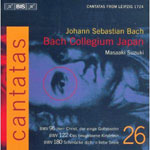
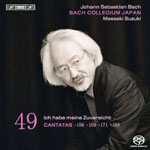
 There
certainly are other excellent cycles of Bach cantatas, especially
the ground-breaking Harnoncourt and Leonhardt series for Teldec,
still available from Warner Classics and as very inexpensive
downloads from amazon.co.uk, and the set which John Eliot Gardiner
recorded in 2000, now complete on his own SDG label and available
for download from classicsonline.com., with some also available
from eclassical.com. There are also several excellent individual
recordings, such as that of the Magnificat and Cantata
110 from Channel Classics which I reviewed in my previous Roundup.
There
certainly are other excellent cycles of Bach cantatas, especially
the ground-breaking Harnoncourt and Leonhardt series for Teldec,
still available from Warner Classics and as very inexpensive
downloads from amazon.co.uk, and the set which John Eliot Gardiner
recorded in 2000, now complete on his own SDG label and available
for download from classicsonline.com., with some also available
from eclassical.com. There are also several excellent individual
recordings, such as that of the Magnificat and Cantata
110 from Channel Classics which I reviewed in my previous Roundup.
The Suzuki series for BIS is certainly a very strong contender.
As you’ll see if you follow my links to the original reviews,
my colleagues are running out of superlatives to describe it.
I shall content myself simply to echo them and to say that the
latest volume is well up to standard. All four of these volumes
contain cantatas for the Christmas and New Year period and three
of them are available in 24-bit downloads for a little more
than the (very reasonable) price of the mp3 and 16-bit lossless.
The linking factor for Volume 49 is the fact that the
texts are all taken from a collection written by Christian Friedrich
Henrici, known as Picaneder, later to be the librettist of the
St Matthew Passion. Cantata 188 exists only in fragmentary form
but the reconstruction of the opening concertante at
least is fairly secure: lovers of Bach will immediately recognise
that it was re-used as a keyboard concerto. The quality of the
reconstructed work is such that we can only imagine what other
Bach settings of Picaneder texts may have been lost.
The booklet which comes with the deal is excellent though, if
I must pick nits, the statement that Estomihi or Quinquagesima
is the last Sunday before the beginning of Passiontide is inaccurate:
it’s the last Sunday before Lent and the Lutheran calendar
didn’t allow cantatas in Lent. Passiontide didn’t
begin until the Fifth Sunday in Lent, commonly known as Passion
Sunday, though that title has more recently been transferred
to the Sixth Sunday, formerly Palm Sunday.
I’ve included Volume 49 because it’s not only the
most recent to be released, Cantata 171 was composed for the
Christmas period, specifically for New Year’s day, the
Feast of the Circumcision. The performances are well up to the
standards of the series and the recording, especially in 24-bit
format, excellent.
Wilhelm Friedemann BACH (1710-1784)
Cantatas Volume 1
Ach, dass du den Himmel zerrissest, BR-WFB F3/Fk93 (Christmas
c.1760) []
Wohl dem, der den Herren fürchtet, BR-WFB F19/Fk76
(September 1752) * []
O Wunder, wer kann dieses fassen? BR-WFB F2/Fk92 (Christmas,
pub.1723) * []
Gott fähret auf mit Jauchzen, BR-WFB F10/Fk75 (Ascension,
mid 1750s) * []
Dorothee Mields (soprano); Gerhild Romberger (alto); Georg Poplutz
(tenor); Klaus Mertens (bass); Bachchor Mainz; L’arpa festante/Ralf
Otto
* world première recordings.
pdf booklet with texts included.
CARUS 83.362 [79:01] – from classicsonline.com
(mp3) or stream from Naxos Music Library
[‘A real winner’ – Recording of the Month:
see review
by Mark Sealey.]
[‘Leap into this world of discovery without hesitation’
– see review
of Volumes 1 and 2 by Dominy Clements.]
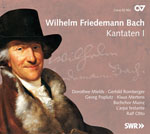
 There’s
a good case for regarding W F Bach as at least the equal of
his more famous siblings; it’s certainly high time that
more of his music was recorded. Carus are really pulling their
weight in that regard with two recent recordings, of which this
is the only one that I’ve had time to hear so far: the
other, on 83.429, is directed by Jürgen Ochs. The music
is striking and the performances and recording do it full justice.
Two of the cantatas are for Christmas, three of them are receiving
first recordings and all four are revelatory.
There’s
a good case for regarding W F Bach as at least the equal of
his more famous siblings; it’s certainly high time that
more of his music was recorded. Carus are really pulling their
weight in that regard with two recent recordings, of which this
is the only one that I’ve had time to hear so far: the
other, on 83.429, is directed by Jürgen Ochs. The music
is striking and the performances and recording do it full justice.
Two of the cantatas are for Christmas, three of them are receiving
first recordings and all four are revelatory.
Eclassical.com, who offer several Carus recordings in lossless
sound, don’t yet seem to have added these albums, but they
do have several Capriccio recordings of WF, conducted by Max
Herrmann which I hope to explore in future roundups.
Leoš JANÁČEK (1854-1928)
Mša glagolskaja (Glagolitic Mass), JW III/9 (final
version) (1928) [39:33]
Sinfonietta, JW VI/18 (1926) [23:32]
Christiane Libor (soprano); Ewa Marciniec (alto); Timothy Bentch
(tenor); Wojciech Gierlach (bass)
Jarosław Malanowicz (organ)
Warsaw Philharmonic Choir (Choirmaster: Henryk Wojnarowski)
Warsaw Philharmonic Orchestra/Antoni Wit – rec. September
2009 and April 2010. DDD
pdf booklet includes texts, which can also be accessed at www.naxos.com/libretti/572639.htm
NAXOS 8.572639 [63:05] – from classicsonline.com
(mp3) or stream from Naxos Music Library
Leoš JANÁČEK (1854-1928)
Mša glagolskaja (Glagolitic Mass), JW III/9 (original
version) [40:29]
Zoltan KODÁLY (1882-1967)
Psalmus Hungaricus, Op. 13b. [22:10]
Tina Kiberg (soprano); Randi Stene (contralto); Peter Svensson
(tenor); Ulrik Cold (bass); Per Salo (organ); Copenhagen Boys’
Choir
Danish National Radio Choir and Symphony Orchestra/Sir Charles
Mackerras – rec. 1993. DDD
pdf booklet with texts and translations included.
CHANDOS CHAN9310 [62:39] – from the classicalshop.net
(mp3 and lossless)
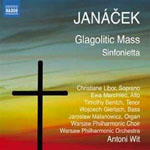
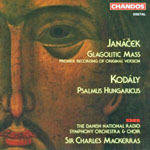 Polish
forces here do justice to Czech national(ist) music in what
Naxos founder and chairman Klaus Heymann describes as ‘a
dream come true for me – Janacek’s non-operatic masterworks
on one album.’ It’s not actually the first such pairing
– Simon Rattle combined them in a 1981 recording, now available
most inexpensively on a super-budget EMI 2-CD set combined with
performances from Charles Mackerras (2376062: William Hedley
was not entirely convinced – see review).
Polish
forces here do justice to Czech national(ist) music in what
Naxos founder and chairman Klaus Heymann describes as ‘a
dream come true for me – Janacek’s non-operatic masterworks
on one album.’ It’s not actually the first such pairing
– Simon Rattle combined them in a 1981 recording, now available
most inexpensively on a super-budget EMI 2-CD set combined with
performances from Charles Mackerras (2376062: William Hedley
was not entirely convinced – see review).
The Karel Ančerl recording of the Mass on Supraphon, from
which I got to know the work for the princely sum of 17/6 is
still available, coupled with Taras Bulba – download
from amazon.co.uk in mp3 for £5.99 or for £4.62
from emusic.com. That recording was my benchmark in that it
was in the back of my mind as listened to Wit and his team and
I didn’t feel the new in any way inferior to the old, with
very similar tempi, give or take a few seconds. More importantly,
all the power of the older version is also present in the new
one – if I say that Wit may well have been listening to
the Supraphon recording, I don’t mean that as a criticism.
In fact he brings out some of the music’s beauty a little
more fully than his predecessor.
At this stage I was forced to think again by reading Nick Barnard’s
review of the CD which, though generally positive, expressed
some reservations, simultaneously with one from another reviewer
which gave the new recording full marks all round. Time to go
back to the most recent Supraphon recording from the Meister,
Charles Mackerras, courtesy of emusic.com, I hoped, only to
discover that my purchase resolutely refused to download. After
almost three days of trying, two tracks still refused to download;
I had to re-purchase track 2, the ‘retry’ button for
track 4 adamantly refused to work, and track 3 cuts out a minute
too soon, so I guess this is one to avoid. What I did obtain
sounds superb, so the loss of the Veruju (Credo)
is especially galling.
I turned instead to Simon Rattle, courtesy of the Naxos Music
Library, a version frequently described as ‘urgent’.
Overall Rattle’s performance is a few seconds faster than
Wit but the difference is rarely significant and it’s not
all one-way: in Uvod (Introduction) and sometimes elsewhere
Wit is slightly faster. Despite the qualities of Rattle’s
version, I see no reason to prefer it to Wit.
The Chandos recording is strictly not comparable since
it embodies a reconstruction of the composer’s original
intents. The differences, however, are not huge – they
mainly involve the appearance of the Intrada at the beginning
and end and some altered rhythms. I’ve seen some criticism
of the soloists but this doesn’t require bel canto
singing and I found the slightly rougher tone well suited to
the style of the music. In many ways this is likely to become
my preferred version in future, especially as the Mass is coupled
with a fine performance of Kodály’s Psalmus Hungaricus,
a long-standing favourite work of mine.
An earlier Naxos recording of the Sinfonietta from Ondrej
Lenárd (8.550411) was one of my few serious disappointments
with the label – it’s just too underpowered, despite
an initial recommendation by Edward Greenfield in The Guardian
and its continuing three-star status in the P_ G_. The new version
from Wit et al more than makes up with all the power lacking
before, despite the paradox that every movement takes slightly
longer than Lenárd or Jiri Bělohlávek (Chandos CHAN8897
– see October 2010 Roundup,
but NB that the Sinfonietta is better value on an all-Janáček
twofer CHAN241-7).
Charles Mackerras, who knew more than a thing or two about Czech
music achieves strength with similarly slightly broader tempi
for this work (EMI Encore and Supraphon). Rattle is consistently
a little faster than Wit or Mackerras – I can’t deny
that his recording has all the oomph that I found lacking in
Lenárd, but so do they without forcing the pace as Rattle
does in the andante second movement at 5:38: even Wit
here seems a little fast at 5:57 by comparison with Mackerras’s
6:18 (EMI).
Repeated comparisons of both works with rival recordings therefore
leaves me more likely to stress the virtues which Nick Barnard
finds in the new Naxos recording and disinclined to share his
reservations, though he has clearly and cogently stated his
‘working’. With texts included and splendid recording,
well conveyed in top-quality mp3, this should be a real winner,
but you may wish to try it out first from the Naxos Music Library
or from the free version of Spotify if you can bear the adverts.
Sergei RACHMANINOV (1873-1943)
Complete Symphonies
Symphony No.1 in d minor, Op13 (1895) [46:13]
The Isle of the Dead, Op.29 [19:48]
Symphony No.2 in e minor, Op.27 (1907) [55:06]
Scherzo in d minor [5:29]
Vocalise (orchestral version), Op.34/14 [6:57]
Symphony No.3 in a minor, Op.44 (1935-6) [37:35]
Symphonic Dances (1940) [34:32]
St Petersburg Philharmonic Orchestra/Mariss Jansons
EMI CLASSICS 5099950088553 [3 CDs: 3:25:40] – from
classicsonline.com
(mp3) or stream from Naxos Music Library
Symphony No.2 in e minor, Op.27 (1907) [56:48]
Vocalise (orchestral version), Op.34/14 [6:44]
Budapest Festival Orchestra/Iván Fischer – rec.
2003? DDD/DSD
Pdf booklet included.
CHANNEL CLASSICS CCSSA21604 [64:35] – from channelclassics.com
(mp3 and 24-bit lossless recordings)
Symphony No.2 in e minor, Op.27 (1907)
Royal Scottish National Orchestra/Sir Alexander Gibson –
rec. 1980. DDD
Pdf booklet available.
CHANDOS CHAN8423 [53:59] – download only (no CD)
from theclassicalshop.net
(mp3 and lossless)
Symphony No.2 in e minor, Op.27 (1907) [59:21]
Vocalise (orchestral version), Op.34/14 [6:36]
Aleko: Intermezzo and Women’s Dance [8:14]
London Symphony Orchestra/André Previn
EMI MASTERS 5099908528957 [74:11] – from classicsonline.com
(mp3) or stream from Naxos Music Library
Sergei RACHMANINOV
Symphony No.3 in a minor, Op.44 (1935-6) [42:47]
Vasily Sergeyevich KALINNIKOV
(1866-1901) Two Intermezzi for Orchestra [10:07]
London Symphony Orchestra/Neeme Järvi – rec. 1987.
DDD
pdf booklet available.
CHANDOS CHAN8614 [52:45] – download only (no CD)
from theclassicalshop.net
(mp3 and lossless)
Sergei RACHMANINOV
Symphony No.3 in a minor, Op.44 (1935-6) [42:47]
Symphonic Dances (1940)* [36:25]
London Symphony Orchestra; Philharmonia Orchestra*/Neeme Järvi
– rec. 1987/1991. DDD
pdf booklet available.
CHANDOS CHAN10234 [79:11] – download from theclassicalshop.net
(mp3 and lossless)
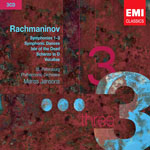 EMI
win hands down in the bargain stakes with the 3-CD set of Jansons
recordings, offered as a download for just £6.99. As Rob
Barnett wrote of the CD set, ‘Musically these recordings
are always better than dependable and often brilliant’
– see full review.
Novices and aficionados alike could do much worse than invest
in these readings – but not in the three separately available
Encore and Great Artists albums, at £5.99 and £7.99
respectively.
EMI
win hands down in the bargain stakes with the 3-CD set of Jansons
recordings, offered as a download for just £6.99. As Rob
Barnett wrote of the CD set, ‘Musically these recordings
are always better than dependable and often brilliant’
– see full review.
Novices and aficionados alike could do much worse than invest
in these readings – but not in the three separately available
Encore and Great Artists albums, at £5.99 and £7.99
respectively.
If you just want the symphonies, Andrew Litton’s recording
on a 2-CD Virgin set is available for streaming from the Naxos
Music Library, which suggests that it will be available from
classicsonline.com shortly. If and when it is, the download
will obviate the problem inherent in the CD format of having
the Second Symphony split across two discs.
Readers of a certain age will remember part of the finale of
the First Symphony being employed as a TV theme tune, presumably
from the Ormandy recording. I chose this movement at random
from both the Jansons and Litton recordings – I own the
latter on CD from its original single-CD release – and
there’s very little to choose between them and the Ormandy,
now on a 2-CD Sony Essential Classics set which doesn’t
appear to be available for download, though the CDs are inexpensive
enough anyway at around £9 in the UK. Litton is just a
touch more dramatic than Jansons but I enjoyed hearing both.
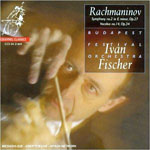 Not
surprisingly, the Fischer recording is a clear winner
in terms of recording quality – it’s available in
decent mp3 and in a variety of lossless flac formats, 24/44.1,
24/96 and 24/192. Nor need there be any reservations about the
performances of the symphony or Vocalise: this is not
just for audiophiles, as the awards which the recording has
gained and the string of endorsements on the Channel Classics
website make clear. It has to be good if my only niggling criticism
concerns the mis-spelling of the name of The Independent in
the booklet.
Not
surprisingly, the Fischer recording is a clear winner
in terms of recording quality – it’s available in
decent mp3 and in a variety of lossless flac formats, 24/44.1,
24/96 and 24/192. Nor need there be any reservations about the
performances of the symphony or Vocalise: this is not
just for audiophiles, as the awards which the recording has
gained and the string of endorsements on the Channel Classics
website make clear. It has to be good if my only niggling criticism
concerns the mis-spelling of the name of The Independent in
the booklet.
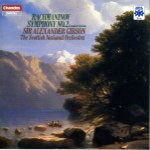 Gibson’s
Symphony No.2 is also available in good lossless sound, albeit
16-bit, as well as decent mp3. It’s a real bargain at just
£4.99 in both formats, which more than compensates for
the shortish playing time. Most earlier versions, such as the
classic Ormandy recording on CBS (now Sony Essential Classics)
had been fairly heavily cut, so this was warmly welcomed at
the time and remains competitive now in terms both of performance
and recording, even against Chandos’s later recordings
from Polyansky and Noseda.
Gibson’s
Symphony No.2 is also available in good lossless sound, albeit
16-bit, as well as decent mp3. It’s a real bargain at just
£4.99 in both formats, which more than compensates for
the shortish playing time. Most earlier versions, such as the
classic Ormandy recording on CBS (now Sony Essential Classics)
had been fairly heavily cut, so this was warmly welcomed at
the time and remains competitive now in terms both of performance
and recording, even against Chandos’s later recordings
from Polyansky and Noseda.
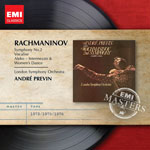 Previn’s
Second, recorded – also complete – a few years earlier
but still sounding well, albeit in mp3 only, is also a bargain
at £5.99. It’s also more generously timed. The performance
– the first, I believe, to be recorded without cuts –
has stood the passage of time well, too.
Previn’s
Second, recorded – also complete – a few years earlier
but still sounding well, albeit in mp3 only, is also a bargain
at £5.99. It’s also more generously timed. The performance
– the first, I believe, to be recorded without cuts –
has stood the passage of time well, too.
Eugene Ormandy and the Philadelphia Orchestra made an
abridged recording of the symphony lasting 45:42 in 1951 for
US Columbia, a version available in the UK but not the USA and
many 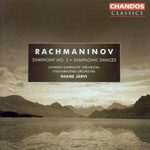 other
countries, from Naxos Classical Archives for £1.99 (9.80342).
Stream from Naxos Music Library where available. The sound is
thin but perfectly tolerable; it was grossly unfair to play
this alongside digital recordings such as Gibson and Fischer
– the latter in 24-bit sound, moreover – but it stands
up well.
other
countries, from Naxos Classical Archives for £1.99 (9.80342).
Stream from Naxos Music Library where available. The sound is
thin but perfectly tolerable; it was grossly unfair to play
this alongside digital recordings such as Gibson and Fischer
– the latter in 24-bit sound, moreover – but it stands
up well.
Järvi’s Third (either coupling) is equally
inexpensive at £4.99 for the mp3; though the lossless
version is priced at £7.99, it’s still quite a bargain.
I imagine that most will choose the more generous coupling with
the Symphonic Dances, which is also still available on CD, though
I’ve listed both. This version of the Symphonic Dances
is also available coupled with the Dances from Aleko
and Caprice bohémien on CHAN9081
(mp3 for £7.99, lossless for £9.99).
Serge RACHMANINOFF (1873 – 1943)
Vesna (Spring), Op.20 (Cantata for baritone solo, choir
and orchestra) (1902) [14:36]
Three Russian Songs for symphony orchestra and chorus, Op.41
(1926) [11:29]
The Bells for chorus, orchestra and soloists, Op.35 (1913) [36:26]
Svetla Vassileva (soprano)
Misha Didyk (tenor)
Alexei Tanovitski (bass)
Chorus of the Mariinsky Theatre
BBC Philharmonic/Gianandrea Noseda – rec. live, July 2011.
DDD
pdf booklet with texts and translations available
CHANDOS CHAN10706 [62:53] – from theclassicalshop.net
(mp3 and lossless)
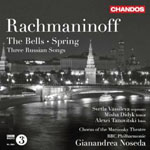 Yes,
this is the same composer, despite Chandos’s now preferred
spelling, which Microsoft Word also prefers. This latest –
seventh and final – offering in their Rachmaninov cycle
with Gianandrea Noseda is a bit of a mixed blessing. It was
recorded live at the Royal Albert Hall on 31 July 2011, during
the Proms. Reviews were mixed – as, indeed, reviews of
Noseda’s earlier Chandos recordings of this composer have
been, with John Quinn here
on MWI more enthusiastic about his Third Symphony than some
others have been. With disagreement even over such fundamental
matters as whether Vassileva’s singing in Vocalise was
ravishing and glowing or too declamatory and wobbly, I was intrigued
to see on which side of the argument my verdict would fall.
Alas, I shall never know – that’s the one item from
the concert not included here, though there would have been
room for it.
Yes,
this is the same composer, despite Chandos’s now preferred
spelling, which Microsoft Word also prefers. This latest –
seventh and final – offering in their Rachmaninov cycle
with Gianandrea Noseda is a bit of a mixed blessing. It was
recorded live at the Royal Albert Hall on 31 July 2011, during
the Proms. Reviews were mixed – as, indeed, reviews of
Noseda’s earlier Chandos recordings of this composer have
been, with John Quinn here
on MWI more enthusiastic about his Third Symphony than some
others have been. With disagreement even over such fundamental
matters as whether Vassileva’s singing in Vocalise was
ravishing and glowing or too declamatory and wobbly, I was intrigued
to see on which side of the argument my verdict would fall.
Alas, I shall never know – that’s the one item from
the concert not included here, though there would have been
room for it.
I couldn’t summon much enthusiasm for the Spring
cantata – perhaps I was expecting something too like Vivaldi’s
or Glazunov’s Seasons, but both of their Springs
really do evoke the season rather than the thoughts of a would-be
wife-murderer. (Admittedly, the Spring puts such thoughts out
of his head.) An interesting work but I don’t expect to
return to it often. Chandos already had another recording, also
coupled with The Bells, available only as a download
(CHAN8966) and it forms the filler to their Polyansky recording
of the Third Symphony (CHAN9802 – see review
in which Ian Lace also appears somewhat lukewarm about this
work), so I’m not sure why they have re-recorded it.
Nor was I any more enthusiastic about the Russian Songs;
I’d gladly have swapped them for Vocalise, whether
glowing or wobbly. The Bells, however, set to words from
a Russian translation of Poe, is a minor masterpiece and it
receives a good, though not definitive performance here. In
the main I found myself in agreement with those who thought
that Noseda and his team made a good showing in this work; though
I note that the chorus sounds a little under-strength numerically,
that’s probably an advantage in listening at home as opposed
to the concert hall. There is a minute degree of wobble in Vassileva’s
voice but isn’t that authentically Slav?
Though recorded live at the Prom, audience noise and applause
are conspicuous by their absence. The original recording was
made in 24-bit/96kHz, so I’m surprised that the only lossless
option is in 16-bit sound, good as that is.
Ralph VAUGHAN WILLIAMS (1872-1958)
Symphony No. 2, A London Symphony (1913, rev.1936) [46:33]
Concerto in a minor for oboe and strings (1942/43) [19:20]
Stéphane Rancourt (oboe)
Hallé Orchestra/Sir Mark Elder – rec. 2010. DDD.
HALLÉ CDHLL7529 [65:56] – from emusic.com
(mp3) or stream from Naxos Music Library.
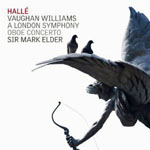 Emusic.com
have beaten other download providers off the mark with this
recording and they have done so at a better bit-rate than many
of their downloads; although at around 220kb/s it’s still
far from ideal, the result sounds perfectly adequate, though
the volume needs a bit of a boost. As for the performances,
they are all that Michael Cookson says of them in his review
– far superior to the Divine Art version of the symphony
which I recommended last month as a stop-gap. John Quinn was
even more fulsome in his praise – review
– awarding a well-deserved Recording of the Month. The
Chandos recording with Richard Hickox, of course, remains in
a class of its own – a one-off opportunity to record the
original score: see my review of the USB version (CHUSB0008)
– here.
Emusic.com
have beaten other download providers off the mark with this
recording and they have done so at a better bit-rate than many
of their downloads; although at around 220kb/s it’s still
far from ideal, the result sounds perfectly adequate, though
the volume needs a bit of a boost. As for the performances,
they are all that Michael Cookson says of them in his review
– far superior to the Divine Art version of the symphony
which I recommended last month as a stop-gap. John Quinn was
even more fulsome in his praise – review
– awarding a well-deserved Recording of the Month. The
Chandos recording with Richard Hickox, of course, remains in
a class of its own – a one-off opportunity to record the
original score: see my review of the USB version (CHUSB0008)
– here.
The new Hallé version is quite a bargain from emusic.com
at £2.94 or less, but its availability for streaming from
the Naxos Music Library suggests that it will soon be on offer
at a better bit-rate from classicsonline.com.* For the full
CD quality, of course, it’s available post-paid for £11
worldwide from MusicWeb International – here.
* As I was converting this Roundup to html
I noted that it is now available from classicsonline.com --
here.
Sir Arnold BAX (1883-1953) Orchestral
Works, Volume 5
Festival Overture [15:36]
Christmas Eve* [17:53]
Dance of Wild Irravel [5:24]
Nympholept – Nature-Poem for Orchestra [17:50]
Pæan [3:19]
Overture to a Picaresque Comedy [10:51]
Cortège for Orchestra [5:49]
* Malcolm Hicks (organ)
London Philharmonic Orchestra/Bryden Thomson – rec.1986/7.
DDD
pdf booklet available.
CHANDOS CHAN10158X [77:17] – from theclassicalshop.net
(mp3 and lossless)
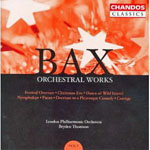 [see
the MusicWeb Arnold Bax website – here]
[see
the MusicWeb Arnold Bax website – here]
Bax’s Christmas Eve may not be especially seasonal
– it’s an evocation of an evening walk in a frosty
landscape with a massive organ part – but it seems to be
the only available version and this, the fifth volume in Chandos’s
reissues of the Bryden Thomson recordings is valuable, especially
for Nympholept. Unless, that is, you’re prepared
to pay a little more for the CD or download of Vernon Handley’s
recording of that work – Graham Parlett thought this probably
the finest ever version of this important work (CHAN10446 –
see review),
finding Bryden Thomson prosaic by comparison, which I think
a little unfair. Compare the two versions for yourself in the
Naxos Music Library if you can.
Joaquín RODRIGO (1901-1999)
Complete Orchestral Works Volume 7
Retablo de Navidad (Christmas Scene) (1952) [22:54]
Hymns of the Neophytes of Qumran (1965, 1975) [19:18]
Music for a Salamancan Codex (1953) [11:06]
Canticle of Saint Francis of Assisi (1982) [18:30]
Raquel Lojendio, Victoria Marchante, Ada Allende, María
Jesús Prieto (soprano)
David Rubiera (baritone)
Orchestra and Chorus of the Comunidad de Madrid/José
Ramún Encinar – rec. 2002. DDD
pdf booklet with texts and translations included.
NAXOS 8.557223 [71:48] – from classicsonline.com
(mp3) or stream from Naxos Music Library
[‘A glorious disc of otherwise unavailable Rodrigo works
for various voices and orchestra which yet again gives the lie
to the idea of the great Spaniard as a classical "one hit
wonder".’ – see review
by Neil Horner.]
[‘This is the sort of musical experience I really love:
like all the best books it’s hard to get into, but once
you’re in it’s a lot harder to get back out. Anyway,
who’d want to?’ – see review
by Paul Serotsky.]
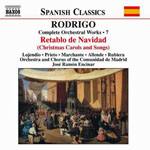
 There’s
sweetness and light here for Christmas Day in the settings of
Christmas songs in a manner reminiscent of Canteloube’s
Songs of the Auvergne and tougher material for when the
turkey and tinsel are but a distant memory. Utterly different
from the Concierto de Aranjuez as this music may be, it’s
very well worth exploring – perhaps try it from the Naxos
Music Library first if you’re not sure: the texts are offered
there, too.
There’s
sweetness and light here for Christmas Day in the settings of
Christmas songs in a manner reminiscent of Canteloube’s
Songs of the Auvergne and tougher material for when the
turkey and tinsel are but a distant memory. Utterly different
from the Concierto de Aranjuez as this music may be, it’s
very well worth exploring – perhaps try it from the Naxos
Music Library first if you’re not sure: the texts are offered
there, too.
This recording remains the only one available of the Christmas
music but the three other works are available from an EMI Classics
anthology of Rodrigo’s music, coupled with Ausencias
de Dulcinea, issued for his centenary and available from
classicsonline.com
in mp3 or to stream from the Naxos Music Library.
Thierry LANCINO (b.1954) Requiem
(2009) [72:09]
Heidi Grant Murphy (soprano, Everyman)
Nora Gubisch (mezzo-soprano, the Sibyl)
Stuart Skelton (tenor, David)
Nicolas Courjal (bass, David the warrior)
Chœur de Radio France
Orchestre Philharmonique de Radio France/Eliahu Inbal –
rec. January 2010. DDD
pdf booklet included. Libretto in French, Latin and Greek with
English and German translations can be accessed online at www.naxos.com/libretti/572771.htm
NAXOS 8.572771 [72:09] – from classicsonline.com
(mp3) or stream from Naxos Music Library
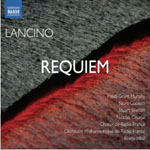 The
Naxos blurb describes this vast work as ‘a challenging
and eloquent contemplation on human mortality’ and founder-chairman
Klaus Heyman claims ‘There are few if any contemporary
works that are as moving as this one’. Parts made a very
powerful impression but, to be honest, I thought the work as
a whole more challenging than eloquent; I think it will be some
time before I come to terms with it, but I believe that it will
be worth persevering, possibly even as rewarding as Britten’s
War Requiem. In fact, if I can cast my mind back to the
first broadcast of that work, I think my reaction then was similar
to that to Lancino now.
The
Naxos blurb describes this vast work as ‘a challenging
and eloquent contemplation on human mortality’ and founder-chairman
Klaus Heyman claims ‘There are few if any contemporary
works that are as moving as this one’. Parts made a very
powerful impression but, to be honest, I thought the work as
a whole more challenging than eloquent; I think it will be some
time before I come to terms with it, but I believe that it will
be worth persevering, possibly even as rewarding as Britten’s
War Requiem. In fact, if I can cast my mind back to the
first broadcast of that work, I think my reaction then was similar
to that to Lancino now.
I certainly cannot challenge the claim that the sound is spectacular,
though even Winamp, which normally joins the music seamlessly,
experienced the odd inter-track hiatus. You will have gathered
that Lancino, like Britten, has set not just the words of the
Tridentine Requiem Mass; the libretto by Pascal Quignard
(b.1948) also includes the Song of the Sibyl in French and Greek
and ‘David’s’ Psalm 18 – after all, both
are mentioned as prophets of the Last Judgement in the Dies
iræ: Teste David cum Sibylla. One to try from
Naxos Music Library first if you can.
Christmas at St John’s College, Cambridge
A sequence of music leading from the darkness of Advent to the
blazing light of Christmas, Epiphany and beyond
Chapel Bell [0:35]
Lenten prose: Rorate cæli [5:21]
O come, O come, Emmanuel [3:25]
Antiphon: O Sapientia [1:00]
Otto GOLDSCHMIDT A tender
shoot [2:08]
Herbert HOWELLS A Spotless
Rose [3:15]
Lo! He comes with clouds descending [4:44]
Antiphon: O Adonai [1:08]
Edward NAYLOR Vox dicentis:
Clama [9:00]
Antiphon: O Radix Iesse [1:02]
Judith BINGHAM The clouded
Heaven [4:50]
Antiphon: O Clavis David [1:09]
John RUTTER There is a flower
[4:28]
Gustav HOLST This have I
done for my true love [5:29]
Antiphon O Oriens [0:57]
Francis POTT Lullay my liking
[6:40]
Antiphon O Rex gentium [0:58]
Peter WARLOCK Bethlehem
Down [4:49]
Antiphon O Emmanuel [1:00]
MORTEN LAURIDSEN O magnum
mysterium [6:50]
O come, all ye faithful [3:54]
Antiphon: Hodie Christus natus est [1:07]
The Choir of St John’s College, Cambridge/David Hill –
rec. 2006. DDD.
pdf booklet with texts and English translations included
HYPERION CDA67576 [74:41] – from hyperion-records.co.uk
(mp3 and lossless)
[‘This is a very fine disc indeed. Though I’ve expressed
one or two reservations the overall impression with which I’m
left is one of great satisfaction and pleasure. The programme
has been assembled with great imagination and the execution
is well nigh flawless. When one adds in excellent and very atmospheric
sound, first rate notes and texts and translations, it all adds
up to a very distinguished package indeed. I shall be surprised
if I encounter a finer CD of Christmas music this year.’
See review by John Quinn: Recording of the Month.]
On Christmas Night
John RUTTER (b. 1945) What
sweeter music [4:35]
Traditional French, arr. Stephen JACKSON
(b. 1951) Noël nouvelet [3:35]
James BURTON (b.
1974) Balulalow [2:25]
William MATHIAS (1934 -1992)
A babe is born, Op.55 [3:24]
Harold DARKE (1888 -1976) In
the bleak mid-winter [4:46]
Traditional French, arr.Mack WILBERG
(b. 1955) Ding! dong! merrily on high [2:48]
Elizabeth POSTON (1905-1987)
Jesus Christ, the apple tree [3:16]
Traditional English, arr.Philip MARSHALL
(1921-2005) I saw three ships [2:02]
Sir Richard Rodney BENNETT (b.
1936) Out of your sleep [1:44]
Peter WARLOCK (1894-1930) Benedicamus
Domino [1:25]
John JOUBERT (b. 1927) There
is no rose [2:27]
Traditional English, arr. Sir David
WILLCOCKS (b. 1919) Tomorrow shall be my dancing
day [2:00]
Matthew MARTIN (b. 1976)
Adam lay ybounden (2006) [3:13]
Matheo FLECHA the Elder (attrib.)
(c.1481-1553) Riu, riu, chiu [2:37]
Tradional English, arr. Ralph VAUGHAN
WILLIAMS (1872-1958) and Sir
Thomas ARMSTRONG (1898-1994) (descant in last verse)
O little town of Bethlehem [3:42]
Traditional German, arr. Michael PRAETORIUS
(1571-1621) (verse 1) and Donald
CASHMORE (b. 1926) Es ist ein Ros’ entsprungen
[2:54]
Christopher ROBINSON (b. 1936)
Make we joy [2:09]
Felix MENDELSSOHN (1809-1847),
arr. Christopher ROBINSON (b.
1936) (last verse) Hark! the herald angels sing [3:15]
Sir John TAVENER (b. 1944) The
Lamb [3:50]
Michael FINNISSY (b. 1946)
Telling (2008) [4:06]
Kenneth LEIGHTON (1929-1988)
Coventry Carol [3:17]
Traditional English, arr. Sir Philip
LEDGER (b. 1937) On Christmas night (Sussex Carol)
[2:03]
Franz Xaver GRUBER (1787-1863),
arr. Sir Philip LEDGER Silent
night [3:13]
John Francis WADE (c. 1711-1786),
arr. Sir David WILLCOCKS
O come, all ye faithful [4:02]
John Challenger (organ)
Choir of St John’s College, Cambridge/Andrew Nethsingha
– rec. January 2011. DDD/DSD
pdf booklet with texts and English translations included
CHANDOS CHAN5096 [74:22] – from theclassicalshop.net
(mp3 and 16- and 24-bit lossless)
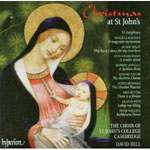
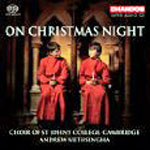 [‘If
I wanted a single disc of Christmas-themed music in my collection
I would be happy with this release from Choir of St John’s
College, Cambridge.’ – see full review
by Michael Cookson]
[‘If
I wanted a single disc of Christmas-themed music in my collection
I would be happy with this release from Choir of St John’s
College, Cambridge.’ – see full review
by Michael Cookson]
 Two
very fine recordings from King’s neighbour. The earlier
Hyperion release is for the most part a slightly abridged version
of the Advent Carol Service which has now become a tradition
at St John’s, while the new Chandos recording offers more
traditional Christmas fare, so there is no overlap between them
apart from the inevitable O come all ye faithful. Play
the Hyperion first – I did so on the eve of Advent Sunday
– and reserve the Chandos if you can until Christmas Eve.
Two
very fine recordings from King’s neighbour. The earlier
Hyperion release is for the most part a slightly abridged version
of the Advent Carol Service which has now become a tradition
at St John’s, while the new Chandos recording offers more
traditional Christmas fare, so there is no overlap between them
apart from the inevitable O come all ye faithful. Play
the Hyperion first – I did so on the eve of Advent Sunday
– and reserve the Chandos if you can until Christmas Eve.
Sleep, Holy Babe – A Collection of Christmas Lullabies
Alexander CAMPKIN (b. 1984) Sleep,
Holy Babe * [4:10]
Gerald FINZI (1901-1956) A
Lullaby * [3:06]
Pierre de MANCHICOURT (c. 1510-1564)
O Emanuel (ed. Tom Shorter) * [3:49]
Anthony MUDGE (b. 1974)
O magnum mysterium * [3:30]
Trevor LING (b. 1933) Magnificat
* [3:38]
Hilary CAMPBELL (b. 1983) Sleep,
my dreaming one * [5:01]
Basque Traditional arr. Jonathan RATHBONE
(b. 1957) Sing Lullaby * [4:51]
Richard PYGOTT (1484-1549) Quid
petis, O Fili? (ed. Tom Shorter) [9:39]
David BEVAN (b. 1951) Magnificat
[4:58]
John DUGGAN (b. 1963) O
Babe, born bare [2:54]
Daniel BURGES (b. 1975)
Coventry Carol * [4:02]
Francis POTT (b. 1957) Lullay,
my Liking [7:29]
Blossom Street/Hilary Campbell – rec. March 2011. DDD.
* World Première Recordings
pdf booklet with texts included.
NAXOS 8.572868 [57:07] – from classicsonline.com
(mp3) or stream from Naxos Music Library

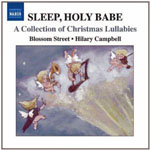 There’s
something old here, but mostly something new, with even the
Finzi receiving its first recording; only track 7, Sing lullaby,
is familiar. I didn’t have time to download this but listened
via the Naxos Music Library; it sounds well enough there for
me to be confident that the 320kb/s version from classicsonline.com
will sound even better. The acoustic of St Sepulchre-without-Newgate
in London is a little cavernous, but that’s not a major
problem. The music is a sheer delight and the performances good
enough for me to predict that I shall be listening to this a
good deal this Christmas and beyond.
There’s
something old here, but mostly something new, with even the
Finzi receiving its first recording; only track 7, Sing lullaby,
is familiar. I didn’t have time to download this but listened
via the Naxos Music Library; it sounds well enough there for
me to be confident that the 320kb/s version from classicsonline.com
will sound even better. The acoustic of St Sepulchre-without-Newgate
in London is a little cavernous, but that’s not a major
problem. The music is a sheer delight and the performances good
enough for me to predict that I shall be listening to this a
good deal this Christmas and beyond.
Vintage Christmas
Have Yourself a Merry Little Christmas [3:28]
Let It Snow [3:14]
Santa Claus Is Coming to Town [3:04]
The Christmas Waltz [2:34]
Hark! The Herald Angels Sing [2:21]
The Christmas Song (Chestnuts Roasting on an Open Fire) [3:58]
Home for the Holidays [2:38]
Christmas Time with You [2:36]
I’ll Be Home for Christmas [3:02]
Silent Night [3:55]
Time with You (duet) [3:14]
Andre Miguel Mayo and Acacia (vocals)
David Ian (piano, guitars, bells)
John Estes (bass, cello)
Brian Fitch (drums)
Booklet included
 PRESCOTT
RECORDS PR-0001 [34:04] – from classicsonline.com
(mp3) or stream from Naxos Music Library
PRESCOTT
RECORDS PR-0001 [34:04] – from classicsonline.com
(mp3) or stream from Naxos Music Library
 Jazzy
settings of some Christmas standards, several of them with some
suitably schmaltzy singing. The booklet, such as it is, is included.
I found the whole thing most entertaining though, at just 34
minutes, I’d have liked more of it. You can find more details
from http://www.iantunes.com
Jazzy
settings of some Christmas standards, several of them with some
suitably schmaltzy singing. The booklet, such as it is, is included.
I found the whole thing most entertaining though, at just 34
minutes, I’d have liked more of it. You can find more details
from http://www.iantunes.com
Retrospect
I’ve included many recommendations of seasonal music in
earlier years, mostly in the following Roundups – click
to follow the links.
* December
2008
* Christmas
2008
* December
2009
* Christmas
2009
* December
2010
* Christmas
2010
There are one or two other reviews which it might be useful
to remind you of:
Gerald FINZI Dies Natalis:
not exactly Christmas music, despite the title, but a setting
of Thomas Traherne’s wonderful evocation of his childhood.
I compared recordings on Hyperion and Chandos in the June 2010
Roundup.
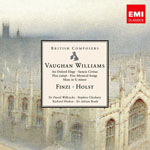 I
should have added the wonderful recording which Wilfred Brown
and Christopher Finzi made for EMI, currently available on a
budget-price 5-CD set which also includes the Immortality Ode
and some other fine performances of music by VW and Holst: download
from classicsonline.com
for £20.99 on 5099909543355.
You may even find the CD set for slightly less than the download.
Please refer to Rob Barnett’s review of this and other
boxes in the series – here
– for full details of the contents. This is still my benchmark
for all other recordings and, for all the qualities of those
Hyperion and Chandos performances, I play it, in an earlier
CD incarnation, more often than any rival version. The set also
contains some other staunch favourites of mine.
I
should have added the wonderful recording which Wilfred Brown
and Christopher Finzi made for EMI, currently available on a
budget-price 5-CD set which also includes the Immortality Ode
and some other fine performances of music by VW and Holst: download
from classicsonline.com
for £20.99 on 5099909543355.
You may even find the CD set for slightly less than the download.
Please refer to Rob Barnett’s review of this and other
boxes in the series – here
– for full details of the contents. This is still my benchmark
for all other recordings and, for all the qualities of those
Hyperion and Chandos performances, I play it, in an earlier
CD incarnation, more often than any rival version. The set also
contains some other staunch favourites of mine.
The original LP coupling was Finzi’s equally wonderful
In terra pax, which is a specifically Christmas
work. Two recordings are available, from Naxos as part of a
Christmas anthology (8.572102 – see review:
download from classicsonline.com
or stream from Naxos Music Library) and on a 2-CD Decca collection
of Finzi’s music (468 8072 – see review).
Despite Rob Barnett’s ‘well done’, the CD is
apparently deleted but the set remains available in mp3 from
passionato.com
or stream from Spotify). The Lyrita recording, the return
of which RB desired, is now available as SRCD.237: CD
or download from amazon.co.uk in mp3 for £7.49.
In brief
There’s such a wealth or riches this month that I’m
recommending some of them in brief.
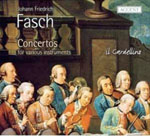 High
on the list is an attractive recording of Concertos for Various
Instruments by Johann Friedrich FASCH
(1688-1750). Il Gardellino oblige on Accent ACC24252
– download from classicsonline.com
(mp3) or stream from Naxos Music Library. Naxos themselves
have done something to make Fasch’s music available but
this Accent recording is superb. The mp3 sound is very good
and the booklet comes as part of the deal. Only the slightly
short playing time [57:40] detracts from the appeal. The same
label and performers have an earlier Fasch anthology on ACC24182
– download from classicsonline.com.
German baroque – think Telemann rather than Bach –
played with Italianate gusto.
High
on the list is an attractive recording of Concertos for Various
Instruments by Johann Friedrich FASCH
(1688-1750). Il Gardellino oblige on Accent ACC24252
– download from classicsonline.com
(mp3) or stream from Naxos Music Library. Naxos themselves
have done something to make Fasch’s music available but
this Accent recording is superb. The mp3 sound is very good
and the booklet comes as part of the deal. Only the slightly
short playing time [57:40] detracts from the appeal. The same
label and performers have an earlier Fasch anthology on ACC24182
– download from classicsonline.com.
German baroque – think Telemann rather than Bach –
played with Italianate gusto.
There are also two volumes of Fasch’s music on Chandos
(CHAN0751 and CHAN0783) – see November 2011/1 Roundup
for Volume 2, where you’ll also find links to Johan van
Veen’s review of Volume 1, my review of the Naxos recording
of Fasch’s Passion, and other reviews by JV of recordings
of Fasch.
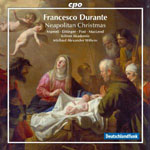
 At
much the same time Francesco DURANTE
(1684-1755) was composing in Naples. There’s an attractive
collection of his Neapolitan Music for Christmas recorded
in 2010 by Roberta Mamelli (soprano), Ursual Eittinger (mezzo),
Andreas Post (tenor), Stephan MacLeod (bass) and the Kölner
Akademie under Michael Alexander Willens on CPO 777 571-2
[72:51] – from classicsonline.com
(mp3) or download from Naxos Music Library. There’s a pastoral
setting of a Nativity scene, two Magnificats, a Litany
of the Virgin Mary and a pastoral Kyrie and Gloria
for a Christmas Mass. Most surprisingly, the booklet which comes
as part of the deal contains no texts, otherwise everything
here is most recommendable.
At
much the same time Francesco DURANTE
(1684-1755) was composing in Naples. There’s an attractive
collection of his Neapolitan Music for Christmas recorded
in 2010 by Roberta Mamelli (soprano), Ursual Eittinger (mezzo),
Andreas Post (tenor), Stephan MacLeod (bass) and the Kölner
Akademie under Michael Alexander Willens on CPO 777 571-2
[72:51] – from classicsonline.com
(mp3) or download from Naxos Music Library. There’s a pastoral
setting of a Nativity scene, two Magnificats, a Litany
of the Virgin Mary and a pastoral Kyrie and Gloria
for a Christmas Mass. Most surprisingly, the booklet which comes
as part of the deal contains no texts, otherwise everything
here is most recommendable.
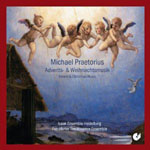
 From
an earlier century (c.1610) I’ve already recommended music
for Advent and Christmas from Michael
PRÆTORIUS (c.1571-c.1621) on Hyperion Helios
CDH55446 at budget price – see November 2011/2 Roundup
– and there’s a recommendation of a BIS recording
of his Christmas music above. I can’t, however, pass by
another attractive collection of his Music for Advent and
Christmas from the Isaak Ensemble, Heidelberg and the Frankfurter
Renaissance Ensemble on Christophorus CHR77142 [74:44]
from classicsonline.com
(mp3) or stream from Naxos Music Library (also available
on mid-price CD with the catalogue number CHE0165-2). A generously
timed album, with fresh-voiced singing and enthusiastic wind
accompaniment – not over-prominent and enjoyable if not
always ideally in tune.
From
an earlier century (c.1610) I’ve already recommended music
for Advent and Christmas from Michael
PRÆTORIUS (c.1571-c.1621) on Hyperion Helios
CDH55446 at budget price – see November 2011/2 Roundup
– and there’s a recommendation of a BIS recording
of his Christmas music above. I can’t, however, pass by
another attractive collection of his Music for Advent and
Christmas from the Isaak Ensemble, Heidelberg and the Frankfurter
Renaissance Ensemble on Christophorus CHR77142 [74:44]
from classicsonline.com
(mp3) or stream from Naxos Music Library (also available
on mid-price CD with the catalogue number CHE0165-2). A generously
timed album, with fresh-voiced singing and enthusiastic wind
accompaniment – not over-prominent and enjoyable if not
always ideally in tune.
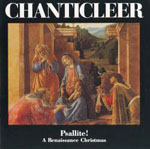
 Psallite:
a Renaissance Christmas contains music by William
BYRD, Josquin DESPREZ, Jakob HANDL, Orlandus LASSUS, John TAVERNER,
bothMicheal and Hieronymus
PRÆTORIUS et al. Only PEROTIN’s
Benedicamus Domino is rather too early to be described
as renaissance music. The performers are Chanticleer, directed
by Joseph H Jennings and the album is Chanticeleer CR-8806
[59:46]. This is a subdued programme, the singing studied and
the tempi often slow by comparison with many of the festive
high jinks on offer; it’s none the worse for that, though
Now make we joy (tr.5) could have done with being a bit
livelier. E la don don and the ubiquitous Riu, riu,
chiu (trs.13-14), on the other hand are lively enough. Download
in mp3 or lossless for just $7.17 from eclassical.com.
Psallite:
a Renaissance Christmas contains music by William
BYRD, Josquin DESPREZ, Jakob HANDL, Orlandus LASSUS, John TAVERNER,
bothMicheal and Hieronymus
PRÆTORIUS et al. Only PEROTIN’s
Benedicamus Domino is rather too early to be described
as renaissance music. The performers are Chanticleer, directed
by Joseph H Jennings and the album is Chanticeleer CR-8806
[59:46]. This is a subdued programme, the singing studied and
the tempi often slow by comparison with many of the festive
high jinks on offer; it’s none the worse for that, though
Now make we joy (tr.5) could have done with being a bit
livelier. E la don don and the ubiquitous Riu, riu,
chiu (trs.13-14), on the other hand are lively enough. Download
in mp3 or lossless for just $7.17 from eclassical.com.
There’s no booklet; the texts come with the classicsonline.com
download of this album, but that’s in mp3 only and costs
£7.99. Subscribers to the Naxos Music Library can also
obtain the booklet. Though made as long ago as 1982, the recording
sounds fine in the eclassical.com lossless download. The physical
CD appears to be no longer available, most of the tracks having
been incorporated into another album, Our Heart’s Joy:
A Chanticleer Christmas.
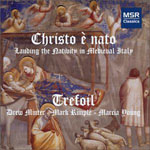
 Earlier
still we return to Italy with a collection released in 2003,
entitled Christo è nato: Lauding the Nativity
in medieval Italy (MSR Classics 1094 [53:09]). The
music is by Johannes CICONIA
(c.1370-1412), Matteo da PERUGIA (fl.1400-1416)
and anonymous works from the Faënza Codex and other collections.
The performers are Drew Minter, Mark Rimple, Marcia Young, collectively
Trefoil, and the album can be downloaded for £6.30 in
mp3 from emusic.com.
Whereas all my recommendations from classicsonline.com, however,
come in 320kb/s sound, emusic.com’s variable bit-rate doesn’t
even quite make it to an acceptable 192kb/s. There are no notes
or texts – I understand that there are paraphrases only
in the CD booklet, and that is not readily available in the
UK anyway – but you can find some details on Drew Minter’s
webpage.
Earlier
still we return to Italy with a collection released in 2003,
entitled Christo è nato: Lauding the Nativity
in medieval Italy (MSR Classics 1094 [53:09]). The
music is by Johannes CICONIA
(c.1370-1412), Matteo da PERUGIA (fl.1400-1416)
and anonymous works from the Faënza Codex and other collections.
The performers are Drew Minter, Mark Rimple, Marcia Young, collectively
Trefoil, and the album can be downloaded for £6.30 in
mp3 from emusic.com.
Whereas all my recommendations from classicsonline.com, however,
come in 320kb/s sound, emusic.com’s variable bit-rate doesn’t
even quite make it to an acceptable 192kb/s. There are no notes
or texts – I understand that there are paraphrases only
in the CD booklet, and that is not readily available in the
UK anyway – but you can find some details on Drew Minter’s
webpage.
Stop Press
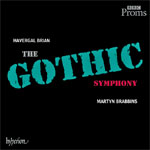 If
this Roundup is a little later than usual it’s because
I waited for the Hyperion recording of Havergal
Brian’s Gothic Symphony, made at the 2011 Proms
(CDA67971/2)
to be available. For some time now we’ve had a very decent
better-than-stop-gap recording pioneered by Marco Polo and reissued
on Naxos. That’s not exactly swept away by the new recording
but that’s now the version of choice. I’ll say more
next time – meanwhile read Rob Barnett’s review
(Recording of the Month and Musicweb International's
newly announced Recording of the Year)
and you’ll find that you needn’t wait for two weeks
for that next Roundup. The lossless version of the recording
is excellent – sounding, as expected, better than the DAB
version of the BBC broadcast on the night. When will the BBC
realise that 192kb/s – too often reduced to 160 kb/s –
is no longer acceptable for classical music? The imminent end
of analogue TV should give them the necessary room to improve
their offering.
If
this Roundup is a little later than usual it’s because
I waited for the Hyperion recording of Havergal
Brian’s Gothic Symphony, made at the 2011 Proms
(CDA67971/2)
to be available. For some time now we’ve had a very decent
better-than-stop-gap recording pioneered by Marco Polo and reissued
on Naxos. That’s not exactly swept away by the new recording
but that’s now the version of choice. I’ll say more
next time – meanwhile read Rob Barnett’s review
(Recording of the Month and Musicweb International's
newly announced Recording of the Year)
and you’ll find that you needn’t wait for two weeks
for that next Roundup. The lossless version of the recording
is excellent – sounding, as expected, better than the DAB
version of the BBC broadcast on the night. When will the BBC
realise that 192kb/s – too often reduced to 160 kb/s –
is no longer acceptable for classical music? The imminent end
of analogue TV should give them the necessary room to improve
their offering.
This is Hyperion’s sole December release, but their January
releases are already available to download -
here.












